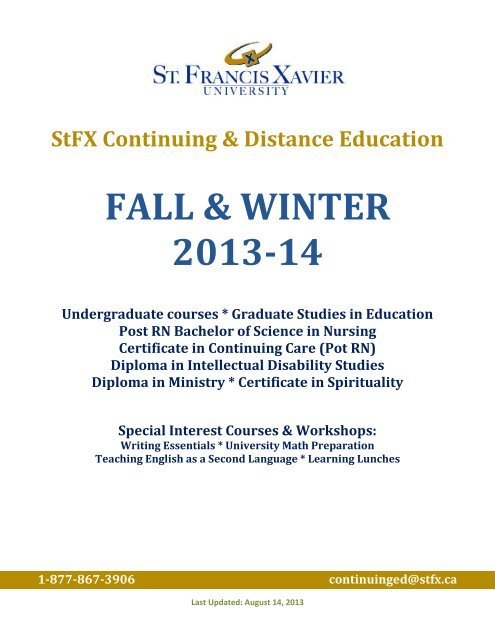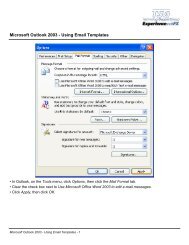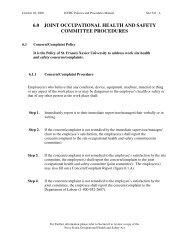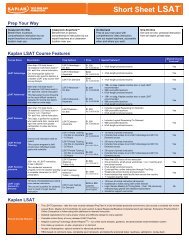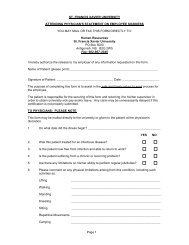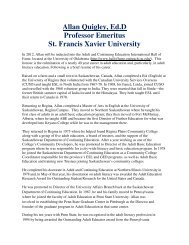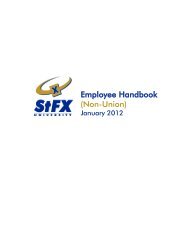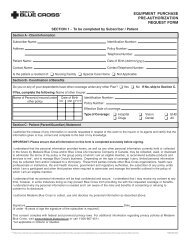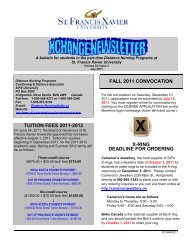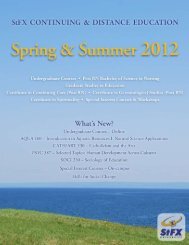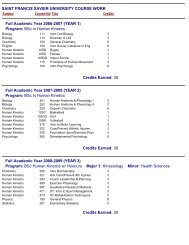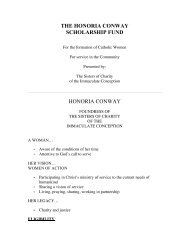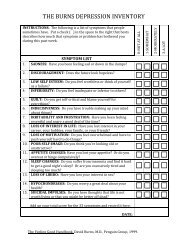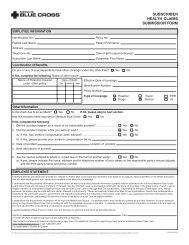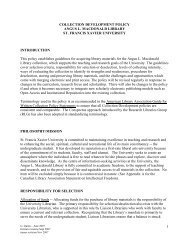Fall / Winter 2013-2014 Calendar - St. Francis Xavier University
Fall / Winter 2013-2014 Calendar - St. Francis Xavier University
Fall / Winter 2013-2014 Calendar - St. Francis Xavier University
Create successful ePaper yourself
Turn your PDF publications into a flip-book with our unique Google optimized e-Paper software.
<strong>St</strong>FX Continuing & Distance EducationFALL & WINTER<strong>2013</strong>-14Undergraduate courses * Graduate <strong>St</strong>udies in EducationPost RN Bachelor of Science in NursingCertificate in Continuing Care (Pot RN)Diploma in Intellectual Disability <strong>St</strong>udiesDiploma in Ministry * Certificate in SpiritualitySpecial Interest Courses & Workshops:Writing Essentials * <strong>University</strong> Math PreparationTeaching English as a Second Language * Learning Lunches1-877-867-3906 continuinged@stfx.caLast Updated: August 14, <strong>2013</strong>
<strong>St</strong>FX Continuing & Distance Education<strong>2013</strong>-<strong>2014</strong>Important Dates ......................................................................................................................................................... 2Part-time <strong>St</strong>udy/Admission to <strong>St</strong>. <strong>Francis</strong> <strong>Xavier</strong> <strong>University</strong> ...................................................................................... 3Online Learning .......................................................................................................................................................... 4Technology Support and Guidelines for Computer-based Distance Courses ............................................................ 5<strong>St</strong>udent Email Accounts. ............................................................................................................................................ 6Course Registration Information ............................................................................................................................... 9Registration Deadlines ............................................................................................................................................. 10Tuition Fees & Payment Options ............................................................................................................................. 11Course Cancellation ................................................................................................................................................. 11Receipts ................................................................................................................................................................... 11Academic Regulations ............................................................................................................................................. 12Academic Counseling ............................................................................................................................................... 12<strong>St</strong>udent ID Cards ...................................................................................................................................................... 12<strong>St</strong>udy Awards ........................................................................................................................................................... 12X-Ring ....................................................................................................................................................................... 13Graduation: Application for Degree and Diploma ................................................................................................... 13UNDERGRADUATE COURSES (ONLINE)<strong>Fall</strong>/<strong>Winter</strong> Schedule................................................................................................................................................ 14POST RN PROGRAMS (DISTANCE)Post RN, Bachelor of Science in Nursing .................................................................................................................. 17Certificate in Continuing Care .................................................................................................................................. 17Certificate in Gerontological Nursing ....................................................................................................................... 17<strong>Fall</strong>/<strong>Winter</strong> Schedule................................................................................................................................................ 18GRADUATE STUDIES IN EDUCATION: MASTER OF EDUCATION PROGRAMProgram Description ................................................................................................................................................ 21<strong>Fall</strong>/<strong>Winter</strong>/Spring ScheduleAntigonish .......................................................................................................................................................... 25Dartmouth ......................................................................................................................................................... 26Halifax ................................................................................................................................................................ 28Online ................................................................................................................................................................ 29Sydney ............................................................................................................................................................... 32PHD IN EDUCATIONAL STUDIES .............................................................................................................................. 33DIPLOMA & CERTIFICATE PROGRAMSDiploma in Intellectual Disability <strong>St</strong>udies ................................................................................................................ 35Diploma in Ministry .................................................................................................................................................. 36Certificate in Spirituality .......................................................................................................................................... 37SPECIAL INTEREST COURSESLearning Lunches ..................................................................................................................................................... 38Writing Essentials .................................................................................................................................................... 39<strong>University</strong> Math Preparation (Online) ..................................................................................................................... 39Teaching English as a Second Language .................................................................................................................. 39UNIVERSITY SERVICES/INFORMATIONThe Campus <strong>St</strong>ore (Bookstore) ................................................................................................................................ 40Angus L. Macdonald Library - Library Services for Distance & Continuing Education <strong>St</strong>udents .............................. 40The Tramble Rooms – Centre for Accessible Learning ............................................................................................ 41The Writing Centre ................................................................................................................................................... 41UNIVERSITY DIRECTORY .......................................................................................................................................... 42Campus Map ............................................................................................................................................................ 42Updated: Wednesday, August 14, <strong>2013</strong>2:50 PM
IMPORTANT DATESSee the current <strong>St</strong>FX Academic <strong>Calendar</strong> for other important dates(http://sites.stfx.ca/registrars_office/sites/sites.stfx.ca.registrars_office/files/Academic_<strong>Calendar</strong><strong>2013</strong>_<strong>2014</strong>.pdf )<strong>2013</strong> FALL TERMJuly 12August 20September 10September 9September 4September 9September 16September 24September 10September 30October 14November 15November 30November 30December 1December 3December 2December 8<strong>2014</strong> WINTER TERMJanuary 6January 6January 6January 13January 20January 20February 15February 15February 24March 3March 29April 1April 7May 4Final date to apply for degree or diploma to be conferred at <strong>Fall</strong> ConvocationRegistration deadline for Master of Education <strong>Fall</strong> term courses, after which a late registrationfee will be chargedDiploma in Ministry <strong>Fall</strong> term courses beginDistance Nursing <strong>Fall</strong> term courses beginUndergraduate <strong>Fall</strong> term classes begin on campusUndergraduate <strong>Fall</strong> term online courses beginDiploma in Intellectual Disability <strong>St</strong>udies <strong>Fall</strong> term courses beginCertificate in Spirituality <strong>Fall</strong> term courses begin (online)Master of Education <strong>Fall</strong> term classes begin (unless otherwise indicated)Application deadline for Thelma May Kempffer Entrance Scholarship for Distance NursingstudentsFinal date to apply for degree or diploma to be conferred at Spring ConvocationApplication deadline for <strong>Fall</strong> term Bursary for Master of Education students and part-timeundergraduate studentsApplication deadline for <strong>St</strong>udy Awards for Part-time Post RN BScN studentsLast day Undergraduate <strong>Fall</strong> term online coursesRegistration deadline for Master of Education <strong>Winter</strong> term courses, after which a lateregistration fee will be chargedFeast Day of <strong>St</strong>. <strong>Francis</strong> <strong>Xavier</strong>Examinations for online undergraduate courses begin<strong>Fall</strong> ConvocationDiploma in Ministry Program <strong>Winter</strong> term courses beginMaster of Education <strong>Winter</strong> term courses beginUndergraduate and Distance Nursing <strong>Winter</strong> term online courses begin (unless otherwiseindicated)Deadline to register for Certificate in Spirituality and Diploma in Intellectual Disability <strong>St</strong>udiesDiploma in Intellectual Disability <strong>St</strong>udies <strong>Winter</strong> term courses beginCertificate in Spirituality <strong>Winter</strong> term courses beginApplication deadline for <strong>Winter</strong> term Bursary Awards for Master of Education students and parttimeundergraduate studentsFinal date to apply for Master of Education Program (Program begins in July)Midterm Recess begins. Continuing & Distance Education courses may substitute the publicschool midterm recess, at the discretion of individual instructorsRegistration deadline for Master of Education Spring term courses, after which a lateregistration fee will be charged.Last day of <strong>Winter</strong> term classes for online undergraduate coursesMaster of Education Spring term beginsExaminations for online undergraduate courses beginSpring Convocation2
<strong>2013</strong>-<strong>2014</strong> CONTINUING & DISTANCE EDUCATION FALL / WINTER PROGRAMSPlease refer to the most current electronic version of this calendar for updated information, available on the<strong>St</strong>FX Continuing & Distance Education website: www.sites.stfx.ca/continuingeducation/.The regulations governing admission and degree requirements are as set forth in the current <strong>St</strong>FX Academic <strong>Calendar</strong>http://sites.stfx.ca/registrars_office/sites/sites.stfx.ca.registrars_office/files/Academic_<strong>Calendar</strong><strong>2013</strong>_<strong>2014</strong>.pdf<strong>St</strong>FX Continuing & Distance Education provides degree, non-degree, and non-credit learning opportunities for personswho wish to study on a part-time basis. Please check the Table of Contents for listings of all programs.<strong>St</strong>udents can call the Continuing & Distance Education Office for general information or for assistance regarding parttimestudy. Our office is located at 2175 Varsity Drive on the 2nd floor of MacDonald Hall.Continuing & Distance Education<strong>St</strong>. <strong>Francis</strong> <strong>Xavier</strong> <strong>University</strong>Antigonish, Nova ScotiaPhone: (902) 867-2372 / 3906 or 1-877-867-3906Email: continuinged@stfx.ca or med@stfx.caDepartment websitehttp://sites.stfx.ca/continuingeducation/<strong>St</strong>udents should note, however, that their primary contacts for information and applications are the addresses or phonenumbers given in each program description. <strong>St</strong>udents are bound by all regulations of the current <strong>St</strong>. <strong>Francis</strong> <strong>Xavier</strong><strong>University</strong> Academic <strong>Calendar</strong>: http://sites.stfx.ca/registrars_office/academic_calendarPART-TIME STUDY<strong>St</strong>. <strong>Francis</strong> <strong>Xavier</strong> <strong>University</strong> provides post secondary educational opportunities to individuals from a variety ofbackgrounds. Many students are not able to take advantage of full-time studies. To assist students who wish to study ona part-time basis, the <strong>University</strong> offers a number of courses / programs through part-time study and distance education.ADMISSION TO ST FRANCIS XAVIER UNIVERSITYNew students or students who have already graduated and wish to take additional courses must apply and pay a $40.00application fee and be admitted to the <strong>University</strong> prior to taking courses. The regulations governing admission anddegree requirements are as set forth in the current <strong>St</strong>FX Academic <strong>Calendar</strong> (see section 1) athttp://sites.stfx.ca/registrars_office/academic_calendar. Prospective students must submit any prior transcripts. Theapplication for admission to undergraduate courses can be downloaded from the following link:http://www.stfx.ca/apply/. The application for admission to the Master of Education program can be found at thefollowing link: http://sites.stfx.ca/continuingeducation/master/application_forms.INTERNATIONAL GRADUATE STUDENTSQualified international students are encouraged to apply for full-time graduate studies in the Master of Educationprogram. Prospective students should plan to be at <strong>St</strong>FX for a minimum of 13 months (July 1 to July 30 of the followingcalendar year). If at all possible international students are encouraged to arrange their travel plans to arrive at <strong>St</strong>FX bythe first of July. For further information on international students, please visit our International <strong>St</strong>udent Office websitelocated at the following link: http://www.stfx.ca/prospective/international/.3
ONLINE LEARNINGTaking courses online provides a flexible and convenient opportunity for you as a student. Online platforms includeMoodle and Blackboard Collaborate TM .Many of our online courses and programs use Moodle as the learning management system, providing students with theflexibility of choosing the time of day or night they wish to participate in their course. Moodle is often used fordiscussions and document sharing throughout the term.Graduate courses in Education (MEd) use both Collaborate and Moodle. Collaborate is real time, meaning you and yourpeers are present at the same time. Through Collaborate, you will be able to listen and speak with others and throughinteractive tools, see and share activities. You will either access your Collaborate classroom via either a link provided toyou from your professor, or via a link in your Moodle course.To ensure that you are prepared to be an online learner and to help you prepare for positive and successful onlineexperiences here are a few tips and suggestions:You must have access to a computer and the Internet on a regular basis. You will need to check your course dailyto participate in discussions and to get course materials and updates. Also, keep your <strong>St</strong>FX email inbox active, asthis is how your professor will communicate with you.You must be prepared to spend at least 10 hours of study time per week for each course you are taking. Onlinecourses provide flexibility and convenience; however, they do require time, commitment, and attention.Time management skills are important in an online course. Check your course daily for new postings, updates,assignment deadlines, quiz dates, etc. In many courses, weekly schedules are provided to help you stay on track.Moodle and Collaborate tutorials are available. Participate in a tutorial before the course begins to ensure thatyou are prepared for the first class. These tutorials will help your understanding of the transition from traditionalclassroom into an online classroom and ensure you have the required technology to participate.You will be expected to participate and share in discussions by responding to questions posted by the instructoras well as responding to postings by others in your class. This is done in an open, constructive, and friendlymanner. Posting your thoughts and comments provides you the opportunity to reflect on your answers beforeposting them.Technology guidelines for Windows and Mac are provided on page 5.TECHNOLOGY SUPPORT AND GUIDELINES FOR COMPUTER-BASED DISTANCE COURSESMoodle Support for students in Continuing & Distance Education programs/coursesEmail: cdesupport@stfx.caContact Continuing & Distance Education Moodle Support if you require support for Moodle or help with technologyissues related to online courses.Collaborate Support/Tutorials for Teaching and LearningEmail: fzadeh@stfx.caPhone: (902) 867-5728Collaborate Technical Support (24/7)Live Chat: http://www.presidiumlearning.net/BlackboardCollaborateLivePerson/Information on Collaborate can also be found at: http://www.blackboard.com/Platforms/Collaborate/Support/Supportfor-Blackboard-Collaborate.aspxPhone: 1-877-382-22934
Minimum system requirements for participating in online coursesWindows SpecificationsOperating System:Processor:Memory:Hard Drive Space:Browser:Email:Plug-ins:Quicktime:Java:Modem:Printer:Monitor:Microphone:Windows XP, Vista, Windows 7 or Windows 81 GHz Pentium 4 minimum, 2 GHz Core 2 Duo or better recommended512 MB of RAM minimum, 1 GB recommended1 GB free disk spaceInternet Explorer 7.0 minimum, Google Chrome recommended<strong>St</strong>udents must use their <strong>St</strong>FX email address (provided by TSG)Flash 8 or higher; these are freely downloaded from Adobe: www.adobe.com/downloadsQuicktime 7.6 or better, free download from the Apple website: www.apple.com/downloadsEnvironment 1.5 or newer, download from: www.java.comHigh Speed Cable / DSL recommendedGraphics-capable printer (inkjet or laser)Minimum Specifications: 15-inch, SVGA, 1024 x 768 minimum screen resolution, 16 bit color(thousands of colors).Recommended Specifications: SVGA, 1024 x 768 minimum screen resolution, 24 or 32 bitcolourOnboard or USB microphone / headsetMac SpecificationsOperating System:Processor:Memory:Hard Drive Space:Browser:Email:Plug-ins:Quicktime:Java:Modem:Printer:Monitor:Microphone:Macintosh OS X 10.4 Tiger or later1 GHz PowerPC G4 minimum, 2 GHz Core 2 Duo or better recommended512 MB RAM minimum, 2 GB Recommended1 GB free disk spaceGoogle Chrome is strongly recommended www.google.com/chrome<strong>St</strong>udents must use their <strong>St</strong>FX email address (provided by TSG)Flash 8 or higher and IF USING SAFARI OR FIREFOX the Schubert|it PDF Plugin is required. Itcan be found at www.schubert-it.com/pluginpdf/Quicktime 7.6 or better, free download from the Apple website:www.apple.com/downloadsLatest Macintosh OS X Java updatesHigh Speed Cable / DSL recommendedGraphics-capable printer (inkjet or laser)Minimum Specifications: 15-inch, SVGA, 1024 x 768 minimum screen resolution, 16 bitcolour (thousands of colours).Recommended Specifications: SVGA, 1024 x 768 minimum screen resolution, 24 or 32 bitcolourOnboard or USB microphone / headset5
STUDENT EMAIL ACCOUNTSYour <strong>St</strong>FX student email account is used for all communication between you and <strong>St</strong>FX. It is vital that you check andmaintain your account regularly.Accessing webmail (your personal <strong>St</strong>FX email account):1. Go to the My<strong>St</strong>FX homepage http://sites.stfx.ca/welcome/2. Select the Webmail link and enter your user name (e.g., x2012abc) and your applicable password as outlined onyour PIN letter.Changing your Password:1. Go to the My<strong>St</strong>FXhomepage2. Click the Webmail link (asnoted above in thescreenshot)3. Click on the ChangePassword link on the leftside of the page6
To view and reset your original password:1. Go to My<strong>St</strong>FX homepage http://sites.stfx.ca/welcome/2. Click on mesAMIS3. Log into the system by using your <strong>St</strong>udent ID as your user name and your 6-digit numeric password7
4. Select ‘myAccounts’5. Select the ‘Reset Original Password’ at the bottom left side of the pageAll students are required to check their <strong>St</strong>FX email accounts on a regular basis and keep the inbox open for deliveries bydeleting unnecessary emails and changing passwords as required. All information coming from the Program Office, aswell as other university offices will be sent to your <strong>St</strong>FX email account only. If you are unable to access your <strong>St</strong>FX emailaccount, please contact the Technology Support Group at tsg@stfx.ca or phone (902) 876-2356 or toll free at 1-888-560-2356.8
COURSE REGISTRATION INFORMATIONThe following course registration information is for undergraduate, Post RN, and Graduate <strong>St</strong>udies in Education. For allother programs, please see specific program information for course registration information.Advanced registration is required: When you have successfully met admission requirements to <strong>St</strong>FX, you will receive aletter of acceptance from the Admissions Office, which contains your <strong>St</strong>FX ID number. In this letter, you are asked to callthe Continuing & Distance Education Office (1-877-867-3906) to register for your first course. At this time, please ask usfor your PIN letter to be forwarded to you. This letter will allow you to, among other things, register for future coursesonline. Continuing students should follow online course registration directions as indicated to follow.Those who wish to take a course at <strong>St</strong>FX for credit at another institution must present a letter of permission from theirhome institution.Check your registration times /dates<strong>St</strong>udents who have been admitted as new non-degree undergraduate students to <strong>St</strong>FX will be sent a letter from theAdmissions Office advising them to contact Continuing & Distance Education to register for their first course. Continuingstudents are requested to view registration information at: www.sites.stfx.ca/registrars_office/Course_TimetableHOW TO REGISTER FOR A COURSE<strong>St</strong>udents are required to register for all their own courses (unless otherwise indicated). To register, you must have your‘PIN Letter’, which contains your <strong>St</strong>FX student ID and your 6-digit numeric password. If you are a new student and havenot received your PIN letter, or if you a returning student having difficulties with our registration process, please contactour Program Office at (902) 867-3906 / 2372 or toll free at 1-877-867-3906.Please note the link below that will bring you to our registration tutorial. This tutorial will guide you through theregistration process step-by-step with screen shots that will help ensure that you are on the right track.1. Select the following link: http://sites.stfx.ca/registrars_office/Course_Timetable2. Click on ‘Log into mesAMIS,’ then enter your student ID and your 6-digit numeric PIN3. Select the Registration link and thenenter your student ID and your 6-digitnumeric PIN once again4. Click on the ‘<strong>St</strong>udent Services’ tab5. Select ‘Registration,’ emphasized by thecolour purple6. Select the appropriate term, i.e., FullAcademic Year 2012-<strong>2013</strong>, or Spring<strong>2013</strong> or Summer <strong>2013</strong>7. Select Add/Drop Classes8. Input the CRN(s) (Course ReferenceNumber) into the field(s) at the bottomof the page9. Once CRNs are entered, click the‘Submit Changes’ at the bottom of thescreenNote the webregistration tutorial link9
When registering online, please ensure that you print a copy of your ‘myGrades’ report which will include any currentregistration you have in our system. If you do not see any current registration, please contact our Program Office forassistance as this may suggest you have encountered technical difficulties. The ‘myGrades’ link can be accessed throughyour personalized mesAMIS: http://sites.stfx.ca/registrars_office/bannermesamis.NOTE: You may not see the tuition charges immediately on your <strong>St</strong>FX financial details. If you see the course listing onyour myGrades report as ‘IP’ (In Progress) you have registered successfully.It is the responsibility of students to know their respective degree patterns. To ensure you are following the rightprogram pattern contact:med@stfx.ca – Master of Education Programdistance.nursing@stfx.ca – Distance Nursing Programadvising@stfx.ca - UndergraduateCOURSE REGISTRATION INFORMATION FOR MASTER OF EDUCATION STUDENTSThe following course registration information is for the Master of Education Program. For all other programs, please seespecific program information on the applicable web pages or contact our Registrar’s Office; contact information locatedwithin the following link: http://sites.stfx.ca/registrars_office/.For all new students in the Master of Education Program, registration for your first two required courses (EDUC 505 and534) will be done for you by the Program Office. These courses are the two core courses that you will take the summerfollowing your acceptance into our program. Remaining course registration will be done by you. The Program Office willbe available to you should you encounter any difficulties with the process. Note: Registration for EDUC 543, 590, 593,and 599 is also done through the Program Office.COURSE DROP AND REFUNDA student wishing to drop a course should immediately log onto the <strong>St</strong>FX registration portal and drop the course.For assistance with our undergraduate distance courses please contact continuinged@stfx.ca or call toll free at1-877-867-3906.For assistance with dropping a distance nursing course please contact distance.nursing@stfx.ca or call toll free1-800-565-4371.For assistance with dropping a Master of Education course please contact med@stfx.ca or call toll free 1-877-867-3906.For all other on campus undergraduate courses please contact registr@stfx.ca or call (902) 867-2160.Refunds are prorated based on the date formal notification is received from the student. Notification to the instructordoes not constitute a formal drop; students must notify the appropriate office on campus as noted above. An additionaladministration fee of $100 will be applied to Master of Education students dropping courses within two weeks of thecourse start date.REGISTRATION DEADLINESRefer to IMPORTANT DATES (page 2)10
TUITION FEES FOR PART-TIME STUDENTSNova Scotia <strong>St</strong>udents:$636.84* per 3-credit course ($765.12 less applicable Tuition Bursary)$1,273.68* per 6-credit course ($1,530.24 less applicable Tuition Bursary)Non-Nova Scotia <strong>St</strong>udents:$739.02* per 3-credit course ($765.12 less applicable Tuition Bursary)$1,478.04* per 6-credit course ($1,530.24 less applicable Tuition Bursary)International <strong>St</strong>udents:$1,480.62* per 3-credit course ($765.12 plus International Fee $715.50)$2,961.24* per 6-credit course ($1,530.24 plus International Fee $1,431.00)*Amounts include Information & Technology fees and <strong>St</strong>udent Union fees and are subject to change by the <strong>St</strong>FX Boardof Governors.Auditing charges are in each instance one-half the regular fee. Only courses without a laboratory component or handsoncomponent may be audited. There is no tuition fee for senior citizens 65 years of age and older enrolled in creditcourses. Proof of age is required.Please see the <strong>St</strong>FX Academic <strong>Calendar</strong> section 2.1.4 for further information:http://sites.stfx.ca/registrars_office/academic_calendarPAYMENT OPTIONSAll tuition fee payments are due the day before the course begins. All payment or receipt inquiries are to be addressedto the <strong>St</strong>udent Accounts Office at (902) 867-2123/3738. Payments may be made online by setting up <strong>St</strong>. <strong>Francis</strong> <strong>Xavier</strong><strong>University</strong> as a Payee and the account number is your <strong>St</strong>FX student ID number. Cheques are to be made payable to <strong>St</strong>.<strong>Francis</strong> <strong>Xavier</strong> <strong>University</strong> and please indicate your student ID number on the cheque.Checking your account balance and making a making a payment on your account:1. Go to the <strong>St</strong>FX student home page (http://sites.stfx.ca/welcome/)2. Select mesAMIS3. Log in using your <strong>St</strong>udent ID as your user name and your six digit numeric password as your PIN.4. From your homepage under ‘Important <strong>St</strong>uff to Check Out’ select ‘Lookup <strong>St</strong>udent Account Information’5. For student account inquiries, please contact the <strong>St</strong>FX Business Office directly at (902) 867-2123COURSE CANCELLATIONThe university reserves the right to cancel any courses for which there is insufficient advance registration. Normally, aminimum of 12 students is required to retain a course on the schedule. If it becomes necessary to cancel a course,students will be notified via their <strong>St</strong>FX email account.RECEIPTST2202As for income tax purposes are available through our student accounts office. The following link will bring youdirectly to student accounts webpage: sites.stfx.ca/financial_services/<strong>St</strong>udentAccounts.11
ACADEMIC REGULATIONSFor information on evaluation procedures and minimum grades consult the <strong>St</strong>FX Academic <strong>Calendar</strong> online athttp://sites.stfx.ca/registrars_office/sites/sites.stfx.ca.registrars_office/files/Academic_<strong>Calendar</strong><strong>2013</strong>_<strong>2014</strong>.pdf.ACADEMIC COUNSELLINGUndergraduate students requiring academic counseling are asked to contact our Academic Advising office at(902) 863-3300 or email advising@stfx.ca.Distance Nursing students please call Continuing & Distance Education at (902) 867-5186 or toll free at 1-800-588-2246 or email distance.nursing@stfx.ca.Master of Education students please call (902) 867-3906 or toll free at 1-877-867-3906 or email med@stfx.ca.IMPORTANT: If you are not sure what courses fit your degree pattern it is vital that you call the appropriate office asindicated above for academic guidance.STUDENT ID CARDS<strong>St</strong>udent ID cards may be obtained by visiting our Safety and Security Office. The office is located at 5005 Chapel Square.For information call (902) 867-3981. Email address: http://www.sites.stfx.ca/security/.STUDY AWARDSSTUDY AWARDS FOR PART-TIME UNDERGRADUATE STUDENTSA limited number of study awards will be granted each year. Each award will be offered by <strong>St</strong>FX Continuing & DistanceEducation to part-time students registered in undergraduate courses. The candidates must meet the following criteria:A. Be a part-time undergraduate student (maximum 15 credits / minimum 3 credits per academic year)B. Demonstrate a financial need by submitting a written personal statementC. Have demonstrated high scholastic standing in previously completed <strong>St</strong>FX coursesDeadline to apply for award is November 15 and February 15 of each year. Application forms can be found atsites.stfx.ca/continuingeducation/undergrad.STUDY AWARDS FOR PART-TIME POST RN BSCN STUDENTSThe Distance Nursing BScN program study award is available to students enrolled in part time post RN BScN distancenursing courses at <strong>St</strong>FX. This award is meant to provide financial assistance and to encourage nurses to continueprofessional development through the attainment of new knowledge and skills. It recognizes students’ commitment topursuing higher education in nursing and dedication to their program of study. The number of awards may vary eachyear. A limited number of $500 awards are available. Successful applicants will have met the following criteria:A. Actively enrolled in the part-time Post RN BScN programB. Have completed a minimum of 12 credits of BScN requirementsC. Demonstrated a financial need by submitting a written personal statementD. Maintained high academic standing in completed courses.Deadline for applications is November 30. Application forms can be located through the following link:sites.stfx.ca/continuingeducation/distance_nursing.12
BURSARY FOR MASTER OF EDUCATION STUDENTSA limited number of $500 bursaries will be granted each year to current students in good standing in the Master ofEducation program. Deadlines for application for each academic year are November 15 and February 15. Applicationforms can be located through the following link: http://sites.stfx.ca/continuingeducation/master/application_forms.X-RINGUndergraduate students in good academic standing at the beginning of their final year of taking courses may considerapplying for the <strong>University</strong>’s X-ring. Master of Education students must be enrolled in 36 credits to apply for their X-ring.The X-ring ceremony takes place on December 3, The Feast of <strong>St</strong>. <strong>Francis</strong> <strong>Xavier</strong>. For information on purchasing your X-ring please call the <strong>St</strong>udents’ Union (902)867-2495. The X-ring webpage can be accessed viawww.stfx.ca/prospective/x-ring.GRADUATION: APPLICATION FOR DEGREE AND DIPLOMA<strong>St</strong>udents in their graduation year MUST apply in order to be considered a candidate for the applicable convocationceremony. The deadline to apply for <strong>Fall</strong> convocation is July 12 and the deadline to apply for Spring convocation isOctober 11. Applications to apply for convocation can be located through your personalized mesAMIS portal. There areno fees associated with this application.It is important to note that no student will be considered a candidate for any particular convocation ceremony withoutan application. The application form is submitted electronically to our Registrar’s Office. The Office of the Registrar willmaintain the candidacy list for both convocation ceremonies. Any questions or concerns regarding the applicationprocess can be emailed to registr@stfx.ca or by phoning (902) 867-2160.13
UNDERGRADUATE COURSESCRN = Course Reference NumberANTIGONISH (ON CAMPUS)For a tentative listing of day and evening classes on the university campus, please refer to the following website:sites.stfx.ca/registrars_office/Course_TimetableONLINE COURSESART 141.66History of Art ICRN 50091COURSES DATES DESCRIPTIONJanuary 6 – March 28, <strong>2014</strong>L. QuiqleyBIOL 220.66Selected Topics in BiologyCRN 50094V. KarunakaranPSCI 295.66Religion and PoliticsCRN 50096L. <strong>St</strong>anPSYC 100.66Introduction toPsychologyCRN 50098OnlineSeptember 9, <strong>2013</strong> –March 28, <strong>2014</strong>OnlineJanuary 6 – March 28, <strong>2014</strong>OnlineSeptember 9, <strong>2013</strong> –March 28, <strong>2014</strong>OnlineThis course is a survey of the visual arts in the western worldfrom prehistoric cave paintings to the great Gothic cathedralsof the late Middle Ages. This will include the art of theancient world – Egypt, Greece and Rome – as well asByzantine, Islamic, and European Art of the Medieval period.Three creditsThis course is for non-science students who are interested inunderstanding biological concepts. The course deals with“how scientific principles are established” and illustrates thisby discussing selected topics of biological and humaninterest. Topics include: evolution and population, diabetes,homeostasis, HIV and vaccines, antibiotic resistance, andcancer. Six credits.This course is an examination of the impact of religion onpolitics and politics on religion. <strong>St</strong>udents will consider therelationship between religion and politics in the Middle East,Northern Ireland, India and Pakistan, Eastern Europe andNorth America. Case studies will demonstrate interactionsbetween the state and Christianity, Islam, Hinduism, Judaism,as well as the influence of religion on citizenship, education,the party system, and social issues. Cross listed as RELS 295.Three credits.This course is a survey of the major topics of psychology aswell as an introduction to the methodology of psychologicalresearch. PSYC 100 is a prerequisite for all other courses inpsychology except PSYC 291, 292, and 390. Six credits.Z. HayesPSYC 354.66Lifespan DevelopmentalPsychology for the HealthSciences I: Childhood andAdolescenceCRN 50119P. HaufSeptember 9 – November 29,<strong>2013</strong>OnlineThe field of developmental psychology is the scientific studyof age-related changes in our bodies, behaviours, thinking,emotions, social relationships, and personalities. Alongsidethis scientific endeavour, the course will provide a basicunderstanding of human development from conceptionthrough adolescence in relation to environmental influences,cultural expectations, maturational processes, and individualdevelopment. Throughout the course we will advance ourknowledge of developmental changes in relation to thecomplex world wherein children are growing up. Credit willbe granted for only one of PSYC 384 and PSYC 260. Threecredits. Prerequisite: PSYC 100.14
PSYC 355.66 / .67Lifespan DevelopmentalPsychology for the HealthSciences II:Adulthood and AgingCRN 50120CRN 50193P. HaufPSYC 372.66Cultural PsychologyCRN 50100T. CallaghanPSYC 374.66 / .67 HumanDevelopment AcrossCulturesCRN 50101 / 50230T. CallaghanJanuary 6 – March 28, <strong>2014</strong>OnlineSeptember 9 - November 29,<strong>2013</strong>OnlineJanuary 6 – March 28, <strong>2014</strong>OnlineLifespan development is an exploration of the biological,cognitive, and psychosocial changes that occur acrossdifferent periods of life. Whereas the course LifespanDevelopmental Psychology for the Health Sciences I focuseson developmental changes during childhood andadolescence, this course will provide a basic understanding ofhuman development from early adulthood till death. Agerelatedchanges in behaviour, thinking, emotions,personalities, and social relationships will be explored inrelation to maturational processes, individual differences,and cultural expectations. Three credits. Prerequisite:PSYC100, PSYC384 or PSYC260.The question of how culture influences human behavior andmind will be explored. For many years research and theory inpsychology have been based on studies conducted primarilyin Western technological societies. There is growing concernthat the basic principles of the discipline may not apply inother cultural contexts. The course will consider the historicalroots of studying culture in psychology and relateddisciplines, the socialization of infants and young childreninto the practices and routines of the culture, andevolutionary, developmental and cultural influences on thebuilding and maintaining of human relationships. Varieties ofexperiences and practices related to mental and physicalhealth that exist in the cultures of the world will also beconsidered. The course will provide a comprehensive reviewof contemporary research findings and theoretical viewpointsas the many facets of this fast-growing discipline ofpsychology are explored. Three credits. Prerequisite: 12credits of PSYC.The main focus in this course will be to consider how culturalcontext has an impact on the course of human development.Human organisms develop within cultural groups. Humandevelopment is best considered within the framework thatsees the developing child, their parents or other agents ofsocialization, and the culture as bundled together within asystem of mutual influence and co-construction. Thebiological predispositions for personality, cognition, andsocial development will provide a blueprint for the possiblepaths that the development of these processes could take,but only as these predispositions unfold within a particularcultural ecology will the developmental path be determined.Cultural studies of human development help us tounderstand how diversity in cultural environments impactsthe nature of parenting beliefs and practices, and throughthese agents of socialization, the course of children’sdevelopment. Three credits. Prerequisite: 12 credits of PSYC.15
RELS 120.66Religion, Spirituality, andHealthCRN 50104R. TekelRELS 295.66Religion and PoliticsCRN 50107L. <strong>St</strong>anSOCI 210.66Sociology of Marriage andFamilyCRN 50108C. AubrechtSOCI 230.66Sociology of EducationCRN 50109D. SmytheSOCI 250.66Deviance and SocialControlCRN 50110D. MacDonaldWMGS 210.66Sociology of Marriage andFamilyCRN 50110C. AubrechtSeptember 9, <strong>2013</strong> –March 28, <strong>2014</strong>OnlineJanuary 6 – March 28, <strong>2014</strong>OnlineSeptember 9, <strong>2013</strong> –March 28, <strong>2014</strong>OnlineSeptember 9, <strong>2013</strong> –March 28, <strong>2014</strong>OnlineSeptember 9, <strong>2013</strong> –March 28, <strong>2014</strong>OnlineSeptember 9, <strong>2013</strong> –March 28, <strong>2014</strong>OnlineThis is an introductory course which provides a thematicfocus on spirituality, healing, and well-being in selectedEastern and Western religious traditions. Each unit of studywill include an introduction to the tradition; explore spiritualpaths pursued by its practitioners; examine characteristics ofillness, healing, and well-being in the tradition; and exploreone or more specific contemporary health concerns andhealing practices which arise from within each religioustradition. Six credits.This course is an examination of the impact of religion onpolitics and politics on religion. <strong>St</strong>udents will consider therelationship between religion and politics in the Middle East,Northern Ireland, India and Pakistan, Eastern Europe andNorth America. Case studies will demonstrate interactionsbetween the state and Christianity, Islam, Hinduism, Judaism,as well as the influence of religion on citizenship, education,the party system, and social issues. Cross listed as PSCI 295.Three credits.This course analyzes the institution of the family from asociological perspective. Attention is given to macro andmicro levels of analysis. <strong>St</strong>atistical profiles of family patternsare employed to illuminate change in family structure overthe past century. Topics include marriage, fertility, parenting,family violence, divorce, and family policy. Cross-listed asWMGS 210. Six credits. Prerequisite: SOCI 100.This course provides students with a social interpretation ofeducation in Canada, emphasizing contemporary structures.<strong>St</strong>udents will investigate the relationship between educationopportunity and conditions of inequality arising fromsocioeconomic status, the economy, family and religion. Sixcredits. Prerequisite: SOCI 100.This course introduces students to the processes of devianceand social control by critically examining the social categoryof deviance and its use in social institutions and daily socialpractices. Topics include: Mental illness, drug and alcoholuse, alternative sexualities, social violence, business crime,the normalization of disability; and forms of social controlsuch as the judicial system, disability, medicine, education,and social interaction. Six credits. Prerequisite SOCI 100.This course analyzes the institution of the family from asociological perspective. Attention is given to macro andmicro levels of analysis. <strong>St</strong>atistical profiles of family patternsare employed to illuminate change in family structure overthe past century. Topics include marriage, fertility, parenting,family violence, divorce, and family policy. Cross-listed SOCI210. Six credits. Prerequisite: SOCI 100.16
POST RN PROGRAMS BY DISTANCEPOST RN BACHELOR OF SCIENCE IN NURSING (DISTANCE)Registered nurses can complete their degree through distance education while living and working in their owncommunities. Explore the learning experience through print-based materials and computer technologies. The 63-creditcurriculum is designed around core nursing competencies with flexibility that allows students to select courses meetingprofessional interests and practical needs.A current RN Registration is required for all distance nursing programs.PART TIME POST RN CERTIFICATE PROGRAMS<strong>St</strong>. <strong>Francis</strong> <strong>Xavier</strong> <strong>University</strong> is pleased to offer certificate programs in clinical specialty areas to Post RN students throughdistance education. Designed specifically for practicing nurses, these courses enable nurses to develop a stronger theorybase, enhance their nursing practice, and address health care needs across nursing practice and life continuums.Each course is transferable into the <strong>St</strong>FX Bachelor of Science in Nursing program and a certificate of completion isawarded upon successful completion of all required courses. Each certificate program is comprised of four requiredcourses valued at 3 credits each, totaling 12 credits overall.CERTIFICATE IN CONTINUING CAREThis program is designed to prepare registered nurses to move into the area of home health care area. This programenables nurses to move from acute care to home health care and expand their professional competencies andknowledge. The core curriculum includes the following courses:N115: Health Teaching and LearningN135: Contemporary Issues in NursingN205: Community Health NursingN425: Comprehensive Health AssessmentCERTIFICATE IN GERONTOLOGICAL NURSINGThis program is designed to prepare registered nurses to deliver holistic, effective care to older adults. Developingknowledge and practical skills enables nurses to address comprehensive needs of older client population, identifyingstrengths as well as professional care needs. The core curriculum includes the following courses:N115: Health Teaching and LearningN245: Aging and the Older AdultN425: Comprehensive Health AssessmentN488: Challenges in Aging: Implications for NursingInformation / Registration:Distance Nursing ProgramsContinuing & Distance Education<strong>St</strong>. <strong>Francis</strong> <strong>Xavier</strong> <strong>University</strong>PO Box 5000, Antigonish, NS B2G 2W5Toll free: 1-800-565-4371 or 1-800-588-2246Email: distance.nursing@stfx.cawww.mystfx.ca/academic/continuinged/Nursing.html17
DISTANCE NURSING FALL/WINTER SCHEDULEBIOL 251.77Human Anatomy andPhysiology ICRN 50139Lab CRN 50140V. KarunakaranCOURSE DATES DESCRIPTIONSeptember 9 -November 15, <strong>2013</strong>OnlineUsing an integrated approach to the study of theintegumentary, skeletal, muscular, nervous, and endocrinesystems, this course provides students with a comprehensiveworking knowledge of the anatomy and physiology of thesesystems. Three credits.BIOL 252.77Human Anatomy andPhysiology IICRN 50152Lab CRN 50153V. KarunakaranCHEM 150D.77General & BiologicalChemistryCRN 50141Lab CRN 50142M. AquinoDNUR 115.77Health Teaching andLearningCRN 50144J. MoseleyDNUR 135.77Contemporary Issues inNursingCRN 50134D. VandewaterJanuary 6 - March 21, <strong>2014</strong>OnlineSeptember 9, <strong>2013</strong>-March 28, <strong>2014</strong>OnlineNovember 18, <strong>2013</strong> -January 31, <strong>2014</strong>OnlineSeptember 9 –November 15, <strong>2013</strong>OnlineAs an integrated study of the cardiovascular, respiratory,urinary, reproductive, and digestive systems, this courseprovides students with a comprehensive working knowledgeof the anatomy and physiology of these systems. Threecredits. Prerequisite: BIOL 251.Topics include basic concepts of general chemistry, anintroduction to organic nomenclature and the reactive offunctional groups, and coverage of the fundamentals ofbiological chemistry. Six credits.In contrast to health protection and illness prevention, healthpromotion is a broad and holistic concept. This courseexplores the concept of health promotion; the nurse’s role inhealth promotion; the teaching-learning process; populationhealth; social action and justice; and the socio-cultural,economic, and political factors that influence health andhealth behaviour. Three credits.The foundation for all subsequent nursing courses, thiscourse explores the evolution of nursing as a profession,including its theoretical and philosophical bases. Topicsinclude Orem’s self-care theory, legal and ethical issues,health care reform, the image of professional nursing, andchanging health care priorities. Three credits.18
DNUR 201.77Community MentalHealth Nursing ICRN 50135TBACOURSE DATES DESCRIPTIONSeptember 9 -November 15, <strong>2013</strong>OnlineThis course introduces the application of mental healthnursing principles to specific clinical disorders. A subsequentelective course, DNUR 202, builds on the foundationsexplored in this course. Practice component. Three credits.DNUR 205.77Community HealthNursingCRN 50148D. MacDougallDNUR 300.77Research MethodsCRN 50146Lab CRN 50158D. DuffDNUR 330.77/.71Legal and Ethical Issues inNursingCRN 50147CRN 50154A. BelardoDNUR 415.77Nursing of Adults IICRN 50136C. MacDonaldDNUR 425.77Comprehensive HealthAssessmentCRN 50149TBAFebruary 3 - April 18, <strong>2014</strong>OnlineNovember 18, <strong>2013</strong> -April 18, <strong>2014</strong>OnlineNovember 18, <strong>2013</strong> -April 18, <strong>2014</strong>OnlineSeptember 9 -November 15, <strong>2013</strong>OnlineFebruary 3 - April 18, <strong>2014</strong>OnlineThis course explores the role of the community health nursein the context of a changing health care system. Topicsinclude population health, primary health care, communityassessment, epidemiology and demography, environmentand ecology, cultural competence, ethics, and community-aspartner.Three credits.This course introduces students to research methods used innursing science. Topics include conducting and appraisingresearch; concepts of research design, implementation,analysis, and interpretation; descriptive and inferentialstatistics; quantitative and qualitative research design; andresearch ethics and biases. Six credits.This course examines the moral and ethical implications ofvarious practices in the field of health care as they affecthuman life and the basic dignity of the person. This coursealso explores the moral, ethical, legal, and theological issuesraised by recent developments in the life sciences. Crosslistedas RELS 300. Six credits.This is a theoretical and practice-based course exploringchronic health issues related to diseases of the nervous,endocrine, and sensory systems, among others. In a primary,secondary, or tertiary setting, students will delivercomprehensive medical or surgical nursing care to adults atrisk for or experiencing a complex health problem.Leadership practice component. Three credits.This theory and practice course focuses on a systematicassessment of the well adult. <strong>St</strong>udents will incorporate healthhistory and physical examination of body systems inidentifying self-care requisites for a diverse population. Threecredits.19
COURSE DATES DESCRIPTIONJanuary 6 - March 21, <strong>2014</strong>DNUR 473.77 / .71Basic Concepts ofPathophysiologyCRN 50151CRN 50155B. SeplakiOnlineThis course provides the student with an understanding ofbasic concepts of pathophysiology. Special emphasis is givento these processes as they affect and are re-affected by theaging process. Three credits. Prerequisites: BIOL 105, 115,251, 252; CHEM 150 recommended.DNUR 483.77 / .71Hospice Palliative CareNursingCRN 50150CRN 50157D. VandewaterDNUR 488.77 / .71Challenges in Aging:Implications for NursingCRN 50137CRN 50138B. SeplakiDNUR 490.77 / .71Forensic NursingCRN 50143CRN 50177S. WilsonDNUR 494.77Leadership andManagement in NursingCRN 50145D. VandewaterJanuary 6 -March 21, <strong>2014</strong>OnlineSeptember 9 -November 15, <strong>2013</strong>OnlineSeptember 9, <strong>2013</strong> -January 31, <strong>2014</strong>OnlineNovember 18, <strong>2013</strong>-January 31, <strong>2014</strong>OnlineThis course provides an overview of theories, currentpractices, and relevant issues in the field of palliative care,with a focus on the nurse’s role. In line with the philosophy ofnursing at <strong>St</strong>FX, students will explore concepts of self-careand health promotion as they relate to quality of life issues.Three credits.Using nursing and sociological perspectives on aging,students will explore holistic care of the older client,including current gerontological issues and trends and theirimplications for nursing. This course has an integratednursing practice component. This course may be used as anopen or NURS elective by third or fourth-year BScN students.Three credits.Forensic nursing refers to the application of nursing scienceand knowledge to legal proceedings. This course will examinethe application of nursing science to the investigation andtreatment of trauma, death, violent or criminal activity, andtraumatic accidents within the clinical or communityinstitution. Patient populations to be considered includevictims of sexual assault; elder, child, and spousal abuse;unexplained or accidental death; trauma and assault; as wellas the perpetrators of these and other criminal activities. Sixcredits.This course is an examination of nursing leadership theoriesand management models and their relationship to clientcare. The course explores the changing roles andexpectations for registered nurses as leaders in the healthcare system. Three credits.20
GRADUATE STUDIES IN EDUCATION: MASTER OF EDUCATIONPROGRAM DESCRIPTIONFor regular admission to the Master of Education program, candidates shall normally have:a. Completed a Bachelor of Education degree or its equivalent;b. Earned an average of at least 70% in the BEd program or have placed in the top 25% of their BEd graduatingclass; andc. Completed at least two years of successful teaching before enrolling in the first graduate course.Considerable weight will also be given to the references supplied by the applicant and to successful teaching experience.Individuals who do not possess a Bachelor of Education degree will normally be considered when they have:a. Gained a teaching license equivalent to a Nova Scotia Initial Certificate (TC5) or have been employed in ateaching capacity for at least two years in a professional school or post-secondary institution; andb. Met all other admission conditions.Meeting the minimum admission requirements does not ensure acceptance into the program. Decisions of the MEdAdmissions Committee are final. Applications will be considered on February 15 of each year for study beginning in Julyof the same year. You are responsible to check with the <strong>St</strong>FX Admissions Office (902-867-2219) before February 15 tomake sure your transcripts and reference letters have arrived. Incomplete files will not be considered for admission.PROGRAM OVERVIEWThe Master of Education program is grounded in two main purposes: to provide a space for student to understand theirprofessional knowledge and to make meaningful links among this knowledge and the conceptual and theoreticalknowledge of educational research.<strong>St</strong>FX offers a MEd degree with specialization in Educational Leadership and Administration, or in Curriculum andInstruction. Within the Educational Leadership and Administration stream a student may chose a focus on InstructionalLeadership. <strong>St</strong>udents must complete the specified core courses and choose electives appropriate to their interests.There are three options by which a student may complete the requirements for the MEd: a thesis route, a project route,or a course-based route. <strong>St</strong>udents who choose the thesis route must complete 24 credits in graduate education coursesand a 12-credit thesis. <strong>St</strong>udents who choose the project route must complete 30 credits in graduate education coursesand a 6-credit project. <strong>St</strong>udents following the course-based route are required to complete 36 credits in graduateeducation courses.The degree fulfills the requirements of the Nova Scotia Department of Education for an increase in level of teachercertification. Nova Scotia students who are granted sabbatical leaves from their board are advised to contact TeacherCertification for approval for their program prior to starting their MEd. Graduate courses in Education are offered as fall,winter, spring, and summer courses in locations around the province and online.Candidates for the MEd are normally required to take EDUC 534 and EDUC 505 as their first two courses on the <strong>St</strong>FXcampus in Antigonish during the summer session immediately after being accepted into the program. EDUC 505 is aprerequisite for EDUC 506, EDUC 507, and EDUC 508. Normally, EDUC 506, EDUC 507, or EDUC 508 is taken after corecourses are completed. EDUC 506 or 507 is required for the thesis and project route; EDUC 508 is required for thecourse-based route.21
EDUCATIONAL LEADERSHIP AND ADMINISTRATION STREAMFirst Summer:534 Introduction to the Foundations of Education 3 credits505 Introduction to Educational Research 3 creditsEducational Leadership and Administration Core Courses (to be taken prior to final research course):561 Leadership and Administrative Theories 3 credits533 Dynamics of Change 3 credits573 Professional Development and Supervision 3 creditsFinal Research Course:506 Quantitative Research Methods in Education 3 creditsor507 Qualitative Research Methods in Education 3 creditsor508 Critical Research Literacy in Education 3 creditsElectives: See course-based, project or thesis routes belowEDUCATIONAL CURRICULUM AND INSTRUCTION STREAMFirst Summer:534 Introduction to the Foundations of Education 3 credits505 Introduction to Educational Research 3 creditsCurriculum and Instruction Core Courses to be taken prior to final research course:527 Principles of Learning 3 credits532 Curriculum Theory 3 credits536 Program Development 3 creditsFinal Research Course:506 Quantitative Research Methods in Education 3 creditsor507 Qualitative Research Methods in Education 3 creditsor508 Critical Research Literacy in Education 3 creditsElectives: See course-based, project, or thesis routes belowCOURSE-BASED, PROJECT, OR THESISMaster of Education degrees in Educational Leadership and Administration and in Curriculum and Instruction areavailable through the following routes:Course-based Route:Core CoursesElectivesor18 credits18 credits22
Project-based Route:Core Courses18 creditsElectives12 credits590 – Project 6 creditsorThesis Route:Core Courses18 creditsElectives6 credits599 – Thesis 12 creditsProject and Thesis students have the opportunity to enroll in EDUC 593 (Directed <strong>St</strong>udy) as one of their electives.Electives are to be selected from the graduate courses offered in Education. No substitution or transfer of credit willnormally be allowed in core courses.Graduate courses which may be taken for credit towards a Master of Education degree are listed in the Academic<strong>Calendar</strong> at:http://sites.stfx.ca/registrars_office/sites/sites.stfx.ca.registrars_office/files/Academic_<strong>Calendar</strong><strong>2013</strong>_<strong>2014</strong>.pdf. Not allcourses are offered each year.Normally only students who have been accepted into the <strong>St</strong>FX Master of Education Program are eligible to enroll ingraduate education courses offered through <strong>St</strong>. <strong>Francis</strong> <strong>Xavier</strong> <strong>University</strong>. Graduate students in good standing from agraduate program at another university may also apply to take up to 12 credits of MEd courses at <strong>St</strong>FX. A letter ofpermission from the student’s current university must be supplied. For further information contact the Continuing &Distance Education Department toll free at 1-877- 867-3906 or email med@stfx.ca.INTERNATIONAL STUDENTSQualified international students are encouraged to apply for full-time graduate studies in the Master of EducationProgram. Prospective students should plan to be at <strong>St</strong>FX for a minimum of 13 months (July 1 – July 30 of the followingyear). International students are encouraged to arrange their travel plans to arrive at <strong>St</strong>FX by the first of July. For furtherinformation on international students, please see: www.mystfx.ca/services/international-student-office/INTERNATIONAL STUDENT HANDBOOKSee www.mystfx.ca/services/international-student-office/pdfs/handbook.pdf. Although this publication is directedtoward full-time undergraduate students, it contains valuable information for graduate students as well. The maindifference is students in the Master of Education Program must plan their arrival on campus for July 1 not September 1as indicated in the International <strong>St</strong>udent Handbook.COHORTSIn partnership with various Nova Scotia school boards, the <strong>St</strong>FX Faculty of Education offers Master of Education cohortsin program areas of identified need. These cohorts provide groups of teachers with opportunities to pursue learningtogether as they build their capacity to provide leadership for the improvement of education within their school board.For further information, please call the Program Office at (902) 867-3906 or toll free at 1-877-867-3906.23
FULL-TIME STUDYAn increasing number of graduate students have opted for full-time study. Approximately 8–12 full-time graduatestudents participate in the program each year. The Faculty of Education wishes to encourage this option as it providesexcellent opportunities for faculty and graduate students to learn and grow together as graduate students workalongside faculty in Bachelor of Education classes.Full-time students have the opportunity to complete a course-based MEd over a 13-month period. <strong>St</strong>udents working ona thesis or project may complete course requirements for the degree over the Summer, <strong>Fall</strong>, and <strong>Winter</strong> terms andbegin their research. Although it is not necessary to know which route (thesis, project, or course-based) to take beforebeginning the program, students interested in the thesis or project as part of their full-time study arrangement shouldcontact the Continuing & Distance Education Department for additional information. All students must begin their MEdprogram in July by taking two courses in the summer school term on the <strong>St</strong>FX campus immediately following theiracceptance into the program.<strong>St</strong>udents in the thesis and project routes will be assigned an advisor who will work closely with them in datacollection and writing stages.Office space and study awards may be available for full-time graduate students.MEd courses may be offered in the late afternoon / evenings and on weekends. <strong>St</strong>udents having a valid NovaScotia teaching license have the option of applying to substitute teach in the community.Application for admission to the full-time / part-time MEd program must be completed by the February 15 admissiondeadline. The full-time program runs from July to July inclusive.PART-TIME STUDYThe majority of Master of Education students are enrolled on a part-time basis. These students normally take one courseper term. To accommodate educators who are working at school during the day, courses are usually scheduled in theevening or on weekends. Most part-time students can expect to finish a course-based program in about 2.5 years orless. Part-time thesis and project students will require a longer time frame and should discuss with their advisor anestimated completion date.SUMMER SCHOOL REQUIREMENTAs part of the Master of Education degree requirement students attend summer session on the <strong>St</strong>FX campus inAntigonish during July immediately following acceptance in to the program. This summer opportunity is an excellentbeginning to the MEd program and one of the many reasons that our MEd program is graduate education students’program of choice. Summer courses offer the opportunity for students to meet and learn from and with educators fromother school jurisdictions across the province, country, and other places around the world. Graduate students find thisinteraction provides excellent opportunities to share ideas that lead to innovation and creative development in theirown professional learning contexts.STFX EMAIL ACCOUNTPlease check your <strong>St</strong>FX email account on a regular basis. All students are required to maintain their <strong>St</strong>FX email accountsby changing their password as required and ensuring their mailbox does not exceed its limit. All information comingfrom the Program Office and from other university departments will be sent to your <strong>St</strong>FX email account only. If you areunable to access your <strong>St</strong>FX email account, please contact our Technology Support Group at tsg@stfx.ca or phone tollfree at 1-888-860-2356 or (902) 867-2356.The web link to the online application form for both full- and part-time applicants is:http://sites.stfx.ca/continuingeducation/master/application_forms.24
MASTER OF EDUCATION COURSE SCHEDULE <strong>2013</strong>-<strong>2014</strong>F = <strong>Fall</strong> term (September – December) Registration deadline: August 20, <strong>2013</strong>W = <strong>Winter</strong> term (January – March) Registration deadline: December 1, <strong>2013</strong>S = Spring term (April – June) Registration deadline: March 3, <strong>2014</strong>Online registration is available to all Master of Education students beginning July 17. Registration is on a first-come, firstservedbasis. Enrolment is limited. Please note registration deadlines. Courses that do not have a minimum enrolmentwith be cancelled. Financial obligation to each registered course does not commence until the day prior to the officialstart of the class.An administration fee of $100 will be applied to students dropping courses within the two weeks prior to the coursestart date.<strong>St</strong>udents enrolled in online or blended courses are required to have a microphone (on-board or external) and speakers.Most courses will have an online component as indicated.All ‘blended’ classes (combination of face-to-face and online) will begin with a face-to-face class.Please check with your professor to confirm all class times and dates during your first class as changes may occur. Alltimes given are in Atlantic <strong>St</strong>andard Time.NOTE: Classes will not be held on October 14 – Thanksgiving Monday.ANTIGONISH<strong>Xavier</strong> Hall, <strong>St</strong>. <strong>Francis</strong> <strong>Xavier</strong> <strong>University</strong>Courses indicated with an asterisk (*) will be available simultaneously face-to-face and online (via Collaborate) -students can choose to take the course in a face-to-face setting or online.COURSE DATES DESCRIPTION*EDUC 527.10 (F)Mondays, 4:00 pm – 7:00 pmPrinciples of LearningCRN 50200C. Boulter*EDUC 533.10 (F)Dynamics of ChangeCRN 50202W. MacAskill*EDUC 507.20 (W)Qualitative Research Methodsin EducationCRN 50203J. MittonSeptember 9 – December 2(no class October 14)Room: XH 123Thursdays, 5:00 pm – 8:00 pmSeptember 12 – November 28Room: XH 123Mondays, 4:00 pm – 7:00 pmJanuary 6 – March 24(no class March 10)Room: XH 12325This course examines theories of learning anddevelopment and their implications for instruction. Inaddition to the general cognitive and behaviourist theories,the course will focus on the aspects of cognitive learningthat are relevant to understanding the diversity of learners.This course examines major concepts in the successfulimplementation of change. <strong>St</strong>udents will learn to recognizeand understand the ways in which change can have animpact on education.This course explores current qualitative methodologiesused in educational contexts. <strong>St</strong>udents will explore thecomponents of a research proposal and develop anunderstanding of methodologies such as phenomenology,ethnography, critical theory, narrative, phenomenology,ethnography, critical theory, narrative, and action research.<strong>St</strong>udents will develop a qualitative research proposal.Normally EDUC 507 is for students pursuing a thesis orproject. Prerequisite: EDUC 505.
*EDUC 532.20 (W)Curriculum TheoryCRN 50204L. Kearns*EDUC 536.30 (S)Program DevelopmentCRN 14601M. Olson*EDUC 573.30 (S)Professional Developmentand SupervisionCRN 14602E. MunroeTuesdays, 4:00 – 7:00 pmJanuary 7 – March 25plus 3 hours TBD(no class March 11)Room: XH 123Wednesdays, 4:00 pm – 7:00pmApril 2 – June 4plus 6 hours TBDRoom: XH 123Tuesdays, 4:00 pm – 7:00 pmApril 1 – June 3plus 6 hours TBDRoom: XH 123In this course major curriculum theories and theorists willbe examined and implications of each position for programdevelopment for schooling will be explored.Program development is investigated from thepractitioner’s perspective using narrative inquiry to explorerelationships among the four curriculum commonplaces ofstudents, teacher, curriculum, and milieu.This course addresses the role of supervision in aninstructional program, focusing on human resources andthe professional development process for instructional andsupport staff.DARTMOUTH (French Immersion Resource Cohort)Bureau de la ré centrale, 250, avenue Brownlow, Unité, Dartmouth (Nouvelle-Écosse)COURSE DATES DESCRIPTIONEDUC 521A.10 (F)L’instruction différenciée enarts langagiers enimmersion/école francophoneà l’élémentaireles samedis 9h-15h21 septembre <strong>2013</strong>19 octobre <strong>2013</strong>16 novembre <strong>2013</strong>CRN 50205A. Martell / J. SanfordImmersion française cohorte 3Collaborate: les mercredis25 septembre, 2 octobre,16 octobre, 30 octobre,6 novembrede 16h30 à 19h30Moodle: 3 heures àdéterminerCe cours traitera du programme d’études des artslangagiers de l’élémentaire et du secondaire premier cycle.Nous explorerons surtout la lecture et l’écriture etcomment différencier les approches pour aider les élèvesqui ont des besoins d’enseignement spécifiques. Nousregarderons les résultats d’apprentissage spécifiques etcomprendrons comment différencier les activités selon lesbesoins des élèves. Nous toucherons divers stylesd’apprentissage pour répondre aux divers besoins desélèves.26
COURSE DATES DESCRIPTIONEDUC 527.11 (F)Les principes del’apprentissage en immersion/école francophoneles samedis 9h-15h21 septembre19 octobre16 novembreCRN 50206I. BernardImmersion française cohorte 4EDUC 564.20 (W)L’administration des écolesinclusivesCRN 50207TBAImmersion française cohorte 3EDUC 514.20 (W)Enseigner aux élèves ayant desdifficultés d’apprentissage enimmersion/école francophoneCRN 50208D. DemersImmersion française cohorte 4EDUC 520C.30 (S)L’instruction différenciée enmathématiques enimmersion/école francophoneà l’élémentaireCRNS. MacDonaldImmersion française cohorte 3Collaborate :le mercredi 2 octobre, 16h-19h ; les lundis 7 octobre, 27octobre, 4 novembre de 16hà 19Moodle: 6 heuresles samedis 9h-15h18 janvier <strong>2014</strong>8 février <strong>2014</strong>22 février <strong>2014</strong>Collaborate:Les mercredis 22 et 29janvier ainsi que les 12 et 19février, de 17h 00à 19h30les samedis 9h-15h18 janvier <strong>2014</strong>8 février <strong>2014</strong>22 février <strong>2014</strong>Collaborate:Les mercredis 22 et 29janvier ainsi que les 12 et 19février, de 16h 30 à 19hLes samedis 1er mars, 29mars, 12 avril et 26 avril<strong>2014</strong> entre 9h00 à 15h00Collaborate:3 heures, le mardi 18 mars<strong>2014</strong> de 16h30 à 19h30Moodle: 9 heures, entre le 3mars au 26 avril <strong>2014</strong>.Les participants auront l’occasion de lire et d’analyser desétudes importantes échelonnées sur plus de 30 ans derecherche sur l’apprentissage en immersion/en écolefrancophone. Le contenu du cours comprendra une revuede l’histoire de l’immersion au Canada et en Nouvelle-Écosse, y compris le contexte historique et le climat social(certains des sujets suivants seront aussi adressés pour lesécoles francophones); les caractéristiques et les structuresde l’immersion; les assises théoriques de l’enseignementpar immersion; les conclusions théoriques tirées derecherches sur l’immersion; l’apprentissage du français, leseffets de l’immersion sur le niveau de maîtrise de l’anglaiset sur l’apprentissage des matières scolaires. Les effets del’immersion sur les élèves défavorisés seront étudiés enparticulier.Ce cours touchera le développement du mouvement versles écoles inclusives et le service aux élèves qui en découle.Les documents du Département d’éducation qui touchentl’administration des écoles inclusives seront étudiés. Descas exemplaires seront discutés pour démontrer commenton peut mettre en pratique les politiques dans la réalitédes écoles publiques de la province.Les participants découvriront l’historique de l’éducationspéciale et du concept de l’inclusion; les manifestations,définitions, et conceptions des troubles et des difficultésd’apprentissage; un survol du dépistage et de l’évaluationdes difficultés; ainsi que les différents modèlesd’intervention à préconiser dans le processus deplanification de programme. Le cours et les devoirs serontorganisés en trois volets: le profil de l’apprenant; lesdifficultés et les troubles d’apprentissage; et l’encadrementdu processus de planification et d’intervention.Ce cours visera la différenciation des mathématiques àl'élémentaire pour aider les élèves qui ont des difficultésavec les concepts de mathématiques.27
COURSE DATES DESCRIPTIONEDUC 505.30 (S)Introduction à la recherche enéducationLes samedis 1er mars, 29mars, 12 avril et 26 avril<strong>2014</strong> entre 9h00 à 15h00CRNA. CurryImmersion française cohorte 4Collaborate:les lundi 17 et 24 mars, 7 et14 avril de 16h à 19 hCollaborate/Moodle : 3heures entre 2 au 16 mars ; 3heures entre 15 avril au 23avrilCe cours d’introduction portera sur les principales phasesd’un projet de recherche ainsi que les paradigmes, lesméthodologies, et les outils de recherche les plusfréquemment rencontrés en éducation. Les participantss’interrogeront sur des questions fondamentales qui s’yassocient, telles que la position du chercheur, l’éthique, etl’évaluation par les pairs. Ils appliqueront les connaissancesacquises à la lecture et la compréhension des articles etdes rapports de recherche ainsi qu’à la planification d’unprojet de recherche.HALIFAX (Halifax Leadership Cohort)Location TBACOURSE DATES DESCRIPTIONEDUC 564.66 (F)Administration of InclusiveSchoolsSaturdays, 9:00 am – 4:00 pmSeptember 14, November 30CRN 50209D. YoungEDUC 501.66 (W)School Data ManagementCRN 50210E. MunroeEDUC 571.66 (S)Specific issues in SchoolAdministration: ProfessionalLearning CommunitiesCRN 14604A. McNeil-WilsonCollaborate:Mondays, 6:00 pm – 9:00 pmSeptember 23, 30October 7, 21, 28November 4, 18, 25Saturdays, 9:00 am - 4:00pmJanuary 11, February 8 andMarch 1Collaborate:Thursdays, 6:00 pm -9:00 pmJanuary 16, 23, 30February 6, 13, 20Saturdays, 9:00 am – 4:00 pmApril 5, June 7Collaborate:Wednesdays, April 9, 16, 23,April 30, May 7, 14, 21, 28Many Canadian educational systems have inclusiveschooling as a priority. This course will provide an overviewof the movement towards inclusive schools and willexplore proven practices in the administration of theseschools.This course will explore how to gather, interpret andtranslate classroom, school, and provincial studentassessment data as part of evidence-based decisionmaking.This course examines recurring and emerging issues ineducational administration from the perspective of theirtheoretical roots <strong>St</strong>udents will address problems identifiedin the literature and in their own practice, develop anunderstanding of the issues involved, examine thetheoretical assumptions influencing these problems, andcreate alternative solution strategies. Three credits.28
HALIFAX (Phys Ed Cohort)Location TBACOURSE DATES DESCRIPTIONSEDUC 520I.66 (F)Current Research inCurriculum: HealthSaturdays, 9:00 am – 4:00 pmSeptember 21, October 19and November 16A critical exploration of recent theories and researchrelated to current issues in curriculum with a concentrationin Health. Three credits.CRN 50211L. Munro-SigfridsonB. SmithEDUC 564.67 (W)Administration of InclusiveSchoolsCRN 50212D. RobinsonEDUC 536.66 (S)Program DevelopmentCRN 14605A. <strong>St</strong>anecCollaborate:Wednesdays, 6:00 pm–9:00pmSeptember 25October 2, 9, 23 and 30November 6Saturdays, 9:00 am – 4:00 pmJanuary 25, March 1, March29Collaborate:Wednesdays, 6:00 – 9:00 pmFebruary 5, 12, 19, 26March 5, 19Collaborate:Mondays, 7:00 – 10:00 pmMarch 31April 7, 14, 21, 28May 5, 12, 26June 2, 9plus 6 hours TBDMany Canadian educational systems have inclusiveschooling as a priority. This course will provide an overviewof the movement towards inclusive schools and willexplore proven practices in the administration of theseschools.Program development is investigated from thepractitioner’s perspective using narrative inquiry to explorerelationships among the four curriculum commonplace ofstudents, teacher, curriculum and milieu.ONLINETimes indicated are Atlantic <strong>St</strong>andard Time*Courses indicated with an asterisk (*) will be available simultaneously face-to-face and online (via Collaborate) - students canchoose to take the course in a face-to-face setting or online.COURSE DATES DESCRIPTIONTuesdays, 6:00 – 9:00 pmEDUC 501.67 (F)School Data ManagementCRN 50213W. Kraglund-GauthierSeptember 10 – November 26This course will explore how to gather, interpret, andtranslate classroom, school, and provincial studentassessment data as part of evidence-based decisionmaking.EDUC 508.66 (F)Critical Research Literacy inEducationCRN 50214M. MeyerMondays, 7:00 – 10:00 pmSeptember 9 – December 2(no class October 14)This course examines educational research issues andtrends from the perspective of professional practice.<strong>St</strong>udents will explore a variety of educational researchpublications in relation to their own educational context.Prerequisite: EDUC 505.29
COURSE DATES DESCRIPTIONMondays, 4:00 pm – 7:00 pm*EDUC 527.10 (F)Principles of LearningCRN 50200C. BoulterSeptember 9 – December 2(no class October 14)This course examines theories of learning anddevelopment and their implications for instruction. Inaddition to the general cognitive and behaviourist theories,the course will focus on the aspects of cognitive learningthat are relevant to understanding the diversity of learners.*EDUC 533.10 (F)Dynamics of ChangeCRN 50202W. MacAskillEDUC 536.10 (F)Program Development(Diversity Cohort)CRN 50215D. GrahamEDUC 544.66 (F)Cross-Cultural Issues inEducationCRN 50216TBAEDUC 545.66 (F)English as a Second LanguageCRN 50217E. KuknerEDUC 569.66 (F)Selected Topics in Education:Leadership for Middle SchoolCRN 50218A. MacNeil-Wilson*EDUC 507.20 (W)Qualitative Research Methodsin EducationCRN 50203J. MittonThursdays, 4:00 pm – 7:00 pmSeptember 12 - November 28Wednesdays, 6:00 – 9:00 pmSeptember 11 – November 27Wednesdays, 6:00 – 9:00 pmSeptember 11 – November 27Tuesdays, 6:00 – 9:00 pmSeptember 12 – November 28Thursdays, 6:00 pm – 9:00 pmSeptember 12 – November 28Mondays, 4:00 pm – 7:00 pmJanuary 6 – March 24(no class March 10)plus 3 hours TBD30This course examines major concepts in the successfulimplementation of change. <strong>St</strong>udents will learn to recognizeand understand the ways in which change can have animpact on education.Program development is investigated from thepractitioner’s perspective using narrative inquiry to explorerelationships among the four curriculum commonplaces ofstudents, teacher, curriculum, and milieu.<strong>St</strong>udents will examine various issues and theories relatedto cultural and race relations and policies and practices inthe education system. Three credits.The course will cover theoretical and methodologicalaspects of learning and teaching a second language,focusing on the learning and teaching of English. <strong>St</strong>udentswill become familiar with the relevant research andexamine the prevalent theories in different ESL areas.This course will explore the current issues and challengesfacing practicing and aspiring middle school administrators.This course explores current qualitative methodologiesused in educational contexts. <strong>St</strong>udents will explore thecomponents of a research proposal and develop anunderstanding of methodologies such as phenomenology,ethnography, critical theory, narrative, phenomenology,ethnography, critical theory, narrative, and action research.<strong>St</strong>udents will develop a qualitative research proposal.Normally EDUC 507 is for students pursuing a thesis orproject. Prerequisite: EDUC 505.
COURSE DATES DESCRIPTIONMondays, 6:00 pm – 9:00 pmEDUC 508.67 (W)Critical Research Literacy inEducationCRN 50220M. MeyerEDUC 527.66 (W)Principles of LearningCRN 50221L. MacDonald*EDUC 532.20 (W)Curriculum TheoryCRN 50204January 6 – March 24(no class March 10)plus 3 hours TBDWednesdays, 6:00 pm – 9:00pmJanuary 8 – March 26(no class March 12)plus 3 hours TBDTuesdays, 4:00 – 7:00 pmJanuary 7 – March 25(no class March 11)This course examines educational research issues andtrends from the perspective of professional practice.<strong>St</strong>udents will explore a variety of educational researchpublications in relation to their own educational context.Prerequisite: EDUC 505.This course examines theories of learning anddevelopment and their implications for instruction. Inaddition to the general cognitive and behaviourist theories,the course will focus on the aspects of cognitive learningthat are relevant to understanding the diversity of learners.In this course major curriculum theories and theorists inthe field of literacy will be examined and implications ofeach position for program development for schooling willbe explored.L. KearnsEDUC 561.66 (W)Leadership andAdministrative TheoriesCRN 50222R. WhiteEDUC 567.66 (W)School LawCRN 50223D. YoungEDUC 569.67 (W)Selected Topics in Education:Assessment for LearningCRN 50224B. MacIsaacEDUC 569.68 (W)Selected Topics in Education:Using Social Media in theClassroom to Engage <strong>St</strong>udentLearningCRN 50225S. Taylor-Foleyplus 3 hours TBDTuesdays, 7:00 pm – 10:00pmJanuary 7 – March 25(no class March 11)plus 3 hours TBDMondays, 6:00 pm – 9:00 pmJanuary 6 – March 24(no class March 10)plus 3 hours TBDTuesdays, 6:00 – 9:00 pmJanuary 7 – March 25(no class March 11)plus 3 hours TBDTuesdays, 6:00 pm – 9:00 pmJanuary 7 – March 25(no class March 11)plus 3 hours TBD31This course is an introductory to theory, research, andpractice in educational administration. Emphasis is placedon the evolutionary nature of administrative theory and itsrole in the operation of public education systems.An examination of legal principles and procedurespertaining to school boards, administrators, and teachers.Consideration will be given to legislation and courtdecisions relative to the organization, policy, andadministration of school districts in Nova Scotia. Threecredits.This course will examine assessment as an ongoing processand an integral part of teaching practice. <strong>St</strong>udents willexamine how to use assessment to inform instruction and,in so doing, increase student achievement. Variousassessment strategies will be examined with a focus oncreating portfolios for assessment purposes.This course will focus on social media for pedagogicalpractice. Teachers will develop a sense of the pedagogicalvalue of various social media in the classroom whether atthe elementary, middle school or secondary level. With afocus on Social Media processes the course will helpeducators see the values in making blogs, videologs,podcasts / vodcasts, youtube videos, websites with theirstudents. Having an interest in ‘playing with technology toengage students’ is far more important than having anyprior technology experience. Regardless of technologicalskills, if teachers are ready to play with technology, thiscourse will be an exciting elective.
EDUC 583.66 (W)Education Planning and PolicyCRN 50226M. MeyerCOURSE DATES DESCRIPTIONWednesdays, 6:00 pm – 9:00pmEDUC 506.66 (S)Quantitative ResearchMethods in EducationCRN 14606TBAJanuary 8 – March 26(no class March 12)plus 3 hours TBDTuesdays, 6:00 pm – 9:00 pmApril 1 – June 3plus 6 hours TBDAn examination of political theory as a basis forconstructing policy and planning for the implementation ofpolicy. Three credits.An introduction to fundamental statistical concepts andmethods, together with practical advice on their effectiveapplication to real-world problems. <strong>St</strong>udents will explorethe basic components of a research proposal. Prerequisite:EDUC 505. Three credits.EDUC 527.66 (S)Principles of Learning(Diversity Cohort – pluslimited seats available)CRN 14607C. Boulter*EDUC 536.30 (S)Program DevelopmentCRN 14601M. OlsonEDUC 569.69 (S)Selected Topics in Education:Assistive TechnologyCRN 14608B. WelsfordEDUC 569.70 (S)Selected Topics: Respondingto Issues of Mental Healthand Trauma in SchoolsCRN 14612R. RyanTuesdays, 6:00 – 9:00 pmApril 1 – June 3plus 6 hours TBDWednesdays, 4:00 pm – 7:00pmApril 2 – June 4plus 6 hours TBDWednesdays, 7:00 pm – 10:00pmApril 2 – June 4plus 6 hours TBDMondays, 6:00 – 9:00 pmMarch 31 – June 9(no class May 19)plus 6 hours TBDThis course examines theories of learning anddevelopment and their implications for instruction. Inaddition to the general cognitive and behaviourist theories,the course will focus on the aspects of cognitive learningthat are relevant to understanding the diversity of learners.Program development is investigated from thepractitioner’s perspective using narrative inquiry to explorerelationships among the four curriculum commonplaces ofstudents, teacher, curriculum, and milieu.This course will introduce course participants to assistivetechnology (AT) supporting learners with learning, physical,sensory (VI & HI) disabilities and Autism. This course willprovide an introduction to the theory behind the successfulidentification, use, and application of AT in classroomsettings to meeting PSP or IPP outcomes. We will discussand apply the details of the reading and writing process,and also provide the opportunity to learn hands-on with avariety of remedial and compensatory AT software andstrategies.This course is designed to assist educators to understandissues around mental health including the concept ofmental health literacy and the emotional impact of socialstigma. The course explores various mental healthchallenges and disorders and obstacles students face. Thecourse describes effective methods to assist teachers inresponding to the emotional trauma of crisis events inschool communities. The focus of this interactive coursewill be on what teachers can do and have done to assiststudents and parents in the area of mental health.32
COURSE DATES DESCRIPTIONTuesdays, 4:00 pm – 7:00 pm*EDUC 573.30 (S)Professional Developmentand SupervisionCRN 14602April 1 – June 3plus 6 hours TBDThis course addresses the role of supervision in aninstructional program, focusing on human resources andthe professional development process for instructional andsupport staff.E. MunroeEDUC 581.66 (S)The Role of the PrincipalCRN 14610J. WithrowThursdays, 6:00 pm – 9:00 pmApril 3 – June 5plus 6 hours TBDAn examination of perspectives on educational leadership,delegation of functionally categorized responsibilities,administration of instructional programs, effectiveenhancement of staff, and the development of productiveand satisfying learning environments for students.SYDNEY (Cape Breton Diversity Cohort)Membertou SchoolCourse Dates DescriptionEDUC 536.10 (F)Program DevelopmentCollaborate:Wednesdays, 6:00 – 9:00 pmProgram development is investigated from thepractitioner’s perspective using narrative inquiry to explore(Diversity Cohort plusSeptember 11 – November 27 relationships among the four curriculum commonplaces ofadditional seats available.)students, teacher, curriculum, and milieu.CRN 50215D. GrahamEDUC 561.10 (F)Leadership andAdministrative TheoriesCRN 50228J. TompkinsEDUC 541.20 (W)Administration of FirstNations EducationCRN 50229TBAEDUC 527.66 (S)Principles of Learning(Diversity Cohort plus limitedseats available)CRN 14607C. BoulterSaturdays, 9:00 am – 4:00 pmSeptember 28November 16Collaborate:Tuesdays, 6:00 – 9:00 pmSeptember 24; October 1, 8,15, 22, 29; November 5, 12Saturdays, 9:00 am – 4:00 pmJanuary 11, March 22Collaborate:Mondays, 6:00 – 9:00 pmJanuary 20, 27; February 3,10, 17 24; March 3, 17Collaborate:Tuesdays, 6:00 – 9:00 pmApril 1 – June 3plus 6 hours TBD33This course is an introductory to theory, research, andpractice in educational administration. Emphasis is placedon the evolutionary nature of administrative theory and itsrole in the operation of public educational systems.An Introduction to the historical, legal, and philosophicalbases of First Nations education. The course will exploreissues related to the roles, responsibilities, and duties ofadministrators in band-controlled schools. Three credits.This course examines theories of learning anddevelopment and their implications for instruction. Inaddition to the general cognitive and behaviourist theories,the course will focus on the aspects of cognitive learningthat are relevant to understanding the diversity of learners.
EDUC 533.66 (S)Dynamics of ChangeCRN 14611W. MacAskillSaturdays, 9:00 am – 4:00 pmApril 12, June 7Collaborate:Thursdays, 6:00 pm – 9:00 pmApril 3, 17, 24May 1, 8, 15, 22, 29This course examines major concepts in the successfulimplementation of change. <strong>St</strong>udents will learn to recognizeand understand the ways in which change can have animpact on education.PHD IN EDUCATIONAL STUDIESInter-<strong>University</strong> Doctoral Program in Educational <strong>St</strong>udiesThe PhD in Educational <strong>St</strong>udies is offered in partnership by <strong>St</strong>. <strong>Francis</strong> <strong>Xavier</strong> <strong>University</strong>, Mount Saint Vincent <strong>University</strong>,and Acadia <strong>University</strong>. This research-oriented doctoral program is jointly administrated by the Inter-<strong>University</strong> DoctoralAdministrative Committee (IDAC). Applicants are admitted to one university and graduate from that Home Institution ofRecord. The website for the inter-university doctoral program is www.educationphd.ns.ca.Doctoral students can focus their studies on one or more of six interrelated themes: curriculum studies, educationalfoundations and leadership, inclusive education, lifelong learning, literacies, and the psychological aspects of education.Applicants are encouraged to review the research interests of education faculty members at all three participatinguniversities, available at their respective websites. An average of 14 students will be admitted each year: 6 at Mount <strong>St</strong>.Vincent <strong>University</strong>, 4 at <strong>St</strong>. <strong>Francis</strong> <strong>Xavier</strong> <strong>University</strong> and 4 at Acadia <strong>University</strong>. The IDAC may consider applicants on acase-by-case basis and waive the fixed application date, if deemed warranted and if space is available in the program forthat year.Admission RequirementsA Master’s level degree from a recognized university in education or in a related field of study (a cognate discipline);Normally, a graduate thesis in a field related to the proposed doctoral studies. Those applicants who have notcompleted a thesis are required to submit evidence of their ability to undertake research in education through thecompletion of a qualifying research paper of sufficient depth and scope to reflect their research competence;Evidence of scholarly preparation to conduct research, normally including graduate level courses in quantitativeand/or qualitative research methods and design;Three letters of reference, normally including two academic and one professional;A recent curriculum vitae indicating current initiatives in education and any academic, scholarly work to date;A letter of intent indicating a proposed area of study from among the six interrelated themes of educational studies;A minimum of A- or 80% average in his or her highest degree.Note: Qualified applicants will only be admitted if a suitable supervisor and program can be provided. To achievesuccess in this doctoral program, applicants must demonstrate strong reading, writing, and comprehension skills in theEnglish language.For further information contact:Ruth Ann d'EntremontMount Saint Vincent <strong>University</strong> (2010-<strong>2013</strong>)Phone (902) 457-6564 Fax (902) 457-0197Email ruthann.dentremont@msvu.cawww.educationphd.ns.ca34
DIPLOMA & CERTIFICATE PROGRAMSDIPLOMA IN INTELLECTUAL DISABILITY STUDIES (ONLINE)The Diploma in Intellectual Disability <strong>St</strong>udies is a professional / personal development non-credit opportunity forindividuals who have some training and / or experience working or living with people who have intellectual disabilities.This online program builds on the knowledge and skills participants already possess regarding community-building andhuman care (Winner of the 2012 Award of Excellence from Canadian Association of <strong>University</strong> Continuing Education).The focus of this five course distance education program is a holistic approach to the needs of persons with intellectualdisabilities with emphasis on building community, fostering spirituality, and celebrating individual giftedness.Participants are required to take part in weekly online discussions with the instructor and course participants. Theprogram has a limited enrollment and each 12-week course is offered on a cyclical schedule. The program can becompleted in 2.5 years. Upon completion of the 5 courses participants will receive a professional development Diplomain Intellectual Disability <strong>St</strong>udies.INDS 110Foundations of Disability andCaregivingA. EscraderCOURSE DATES DESCRIPTIONSeptember 16 toDecember 6, <strong>2013</strong>INDS 120Relationships, Advocacy, andVisionA. EscraderINDS 130Human DevelopmentJ. SumarahINDS 140Building CommunityM. HryniukINDS 150PracticumD. LeuschnerJanuary 20 – April 11, <strong>2014</strong>September 16 – December 6,<strong>2013</strong>January 20 – April 11, <strong>2014</strong>Open AccessTuition: $500 per course + textsCourses are also offered independently for interest (excluding the practicum).35This course provides a foundation in the history andevolution of the concept of disability in the West, fromsocio-cultural and medical perspectives. It also examinessocial, economic, and political policy approaches and howthey have been used to care for, label, or control peoplewith disabilities. The topics are explored through the lensof intellectual disability, but also have general relevance forall disabilities.This course focuses on enduring questions andcontemporary issues related to building relationship andcommunity together with people who have intellectualdisabilities. This course takes the position that having adisability is not so much an individual problem or deficit asit is a socially- and culturally-mediated phenomenon.The purpose of this course is to introduce students to thefield of human development and to persons withintellectual disabilities. A critical examination of a numberof issues related to development will shed light on currentpractices in human services. This course will focus oninsights, challenges, and opportunities related to thecognitive/physical, social/emotional, and spiritual/moralaspects of development and persons with intellectualdisabilities.A spiritual approach is used to examine topics such asunderstanding self/understanding others, spirituality andrelationships, and building inclusive communities.The intent of the practicum is to provide an opportunity forlearners to apply to the work or home setting thestrategies and theories learned in the first four courses.The specific focus of the practicum is to be determined inconsultation with the practicum advisor.
For further information contact:Diploma in Intellectual Disability <strong>St</strong>udiesContinuing & Distance Education<strong>St</strong>. <strong>Francis</strong> <strong>Xavier</strong> <strong>University</strong>PO Box 5000, Antigonish, NS B2G 2W5Phone: (902) 867-4696 or toll free 1-866-551-7575Email: inds@stfx.caWebsite: sites.stfx.ca/continuingeducation/INDSDIPLOMA IN MINISTRY (PRINT-BASED)The Diploma in Ministry consists of five 12-week courses that can be taken over a 2 to 3 year period through print-baseddistance education. Current study topics include: ministry, scripture, adult religious education, sacraments, andcontemporary catholic issues. This is a learner-centered program with curriculum and assignments relevant to thestudent’s experience and church involvement. The program concludes with a practicum whereby the student develops aministry-based project.The Certificate in Lay Ministry is an alternative to the diploma program and requires completion of MNST 110 (seebelow) and any 3 electives in the Diploma in Ministry Program. Courses are offered independently for interest (excludingthe practicum).COURSE DATES DESCRIPTIONSeptember 9 –November 29, <strong>2013</strong>MNST 110Ministry in the ChristianCommunity: Called to ServiceThis course examines the evolution of various dimensionsof ministry. It places particular emphasis on collaborativeministry and our call to service through baptism.M. BoucherMNST 120Adult Religious EducationM. MacKinnon-SimmsMNST 130Biblical FoundationsC. MacDonaldMNST 140Christian SacramentsRev. Paul AbbassJanuary 6 – March 28, <strong>2014</strong>September 9 –November 29, <strong>2013</strong>January 6 – March 28, <strong>2014</strong>This course offers an overview of adult education theory asit applies to ministry. Effective strategies and techniquesfor adult religious education are included.This course examines the Old and New Testaments so thatthe learner will come to an appreciation of the historical,literary, and theological features of the Bible. The learnerwill acquire knowledge of biblical material as it relates tocontemporary ministry.This course examines the sacraments in light of today’schanging reality of Church.MNST 160Self Directed <strong>St</strong>udyS. EatonOpen AccessIn consultation with the Program Office, the learnerexplores a topic from an area related to ministry anddevelops a study plan in consultation with an advisor. Thetopic may be an area that prepares the learner for thepracticum requirement.36
MNST 170PracticumS. EatonCOURSE DATES DESCRIPTIONOpen AccessIn collaboration with a diocese/parish and the ProgramOffice, the learner designs and delivers a ministry projectwhich integrates acquired knowledge and skills, whichresponds to the needs of the local church, and whichaddresses the interests of the learner.Tuition: $515 per course + textsCourses are also offered independently for interest (excluding the practicum).Information / RegistrationMinistry Programs OfficeContinuing & Distance Education<strong>St</strong>. <strong>Francis</strong> <strong>Xavier</strong> <strong>University</strong>PO Box 5000, Antigonish, NS B2G 2W5Phone: (902) 867-3319 or toll free: 1-877-867-5562Email: diplomainministry@stfx.caWebsite: sites.stfx.ca/continuingeducation/ministry/CERTIFICATE IN SPRITUALITY (ONLINE)The focus of this series of online courses is to help individuals discern and develop their spirituality through topics onfaith, personal growth and relationships, and spiritual writers. Each 10-week course is offered on an individual basis andas a module in the Certificate in Spirituality program. A Certificate in Spirituality is awarded upon successful completionof four courses.COURSE DATES DESCRIPTIONSPRT 110On The Road to Emmaus:Spirituality in the ChristianJanuary 27 – April 4, <strong>2014</strong> This course provides an overview of spirituality with a focuson the Christian tradition. The course reflects on theexperience of the disciples on the road to Emmaus andTraditionhow that experience of walking with Christ and breakingbread together is foundational for Christian spirituality anddiscipleship.J. GouletSPRT 120An Interfaith Journey:Exploring Prayer andSpiritualityS. DoyleSPRT 130A Theology of the Heart:The Life and Writings of HenriNouwenS. LazarusJanuary 27 – April 4, <strong>2014</strong>April 21 – June 27, <strong>2014</strong>This course is an interfaith exploration into spirituality withresources offered from various traditions. The goals arepractical and existential: to gain insight and to experiencean even deeper simplicity and relatedness with self, others,and God through prayer.This is an intense, practical introduction to the rich legacyof Henri Nouwen’s life and writings. Through the courseassignments, interactions, and responses, students aregiven an opportunity to interact intimately with the widerange of Henri’s literary output, to allow these importantthemes to intersect with their own life experience, and todevelop a creative response to the material covered.37
COURSE DATES DESCRIPTIONSPRT 140Spirituality of Family andSept 23 – Nov 29, <strong>2013</strong> In this course, participants will examine spirituality in allaspects of life by exploring the formation of theirRelationshipsperception of the world, themselves, relationships, and lifelived in their family of origin, and/or intentional families ofchoice. They will have the opportunity to integrate theirD. Kostynuikfinding and generate choices from a deeper consciousnessSPRT 150Spirituality and Healing:Nourishing the Soul of theCaregiverT. MaddixTuition: $500 per course + textsSept 23 – Nov 29, <strong>2013</strong>Information / RegistrationMinistry Programs OfficeContinuing & Distance Education<strong>St</strong>. <strong>Francis</strong> <strong>Xavier</strong> <strong>University</strong>PO Box 5000, Antigonish, NS B2G 2W5Phone: (902) 867-3319 or toll free: 1-877-867-5562Email: spirtualitycertificate@stfx.caWebsite: sites.stfx.ca/continuingeducation/ministry/certificateof themselves, family, relationships, and spirituality.Caregivers, whether as a professional or through a dailyoccurrence at home, require the ability to know oneself, beopen to others and diverse experiences, and have awillingness to say “no” when setting boundaries. We willexplore how best to nourish one’s soul in the midst of dailyliving and caring, by exploring our motives, the variousstages of spiritual/human development, burnout, and howto make good ethical decisions.SPECIAL INTEREST COURSES<strong>St</strong>FX Continuing & Distance Education offers a variety of non credit special interest courses. Professional developmentcourses include <strong>University</strong> Math Preparation, and Teaching English as a Second Language. Workshop topics vary throughthe term but include broad categories such as computer programs, art workshops and modern languages (e.g., French,German, and Spanish).LEARNING LUNCHES (Antigonish)Learning Lunches for 55+Presenters and topics TBAFor additional informationcall (902) 867-5561 oremail: mlmacinn@stfx.caDATESPresentation Dates:September 19, October 17,November 21, December12, January 16, February20, March 20, April 17 andMay 15DESCRIPTION<strong>St</strong>FX Continuing & Distance Education offers a series ofLearning Lunches in partnership with People’s Place Library,Antigonish. Talks are presented once a month, September toMay in People’s Place Library or other locations inAntigonish. Content is geared toward adults 55+ but talks areopen to the general public and are free of charge. Bring yourlunch and enjoy an hour of interesting and informativediscussion.38
WRITING ESSENTIALS (Online)COURSE DATES DESCRIPTIONWriting EssentialsTBA6 sessionsDates: TBA, <strong>Fall</strong> termTuition:$132.25 (includes HST)Writing is necessary for all students in higher education. It isa process. This non-credit writing for Academic purposescourse provides students with a framework and techniquesfor effective written communication. From understandingyour task to the necessary research and reading to theplanning and writing of the various drafts, participants willgain a better understanding of the writing process.UNIVERSITY MATH PREPARATION (Online)<strong>University</strong> MathPreparationD. MacFarlaneCOURSE DATES DESCRIPTIONJanuary 27 –March 16, <strong>2014</strong>Tuition: $373.75 (includesHST)Registration deadline:January 23, <strong>2014</strong>This non-credit interactive course is intended to preparestudents for university level math courses. Some of the maintopics studied in this course are mathematical functions,trigonometry, and an introduction to limits. This onlinecourse uses Moodle and Collaborate TM (a microphone andspeakers or headset is required) and features 12 lessons,video lectures, supplementary materials as well as guidanceand feedback from the instructor. This is a great opportunityto prepare for successful participation in university mathcourses, from the convenience of your home, and withflexibility for your schedule.TEACHING ENGLISH AS A SECOND LANGUAGE (Antigonish)COURSE DATES DESCRIPTIONMarch 4 - March 25, <strong>2014</strong>Tuesdays, 6:00 – 8:00 pmTeaching English as aSecond LanguageS. Neville-MacLeanRegistration Deadline:February 28, <strong>2014</strong>Tuition: $92 (includes HST)Considering going abroad to teach English? Interested intutoring a non-English speaker in your hometown?Why not add to your skill set (and resume) in a relaxedatmosphere? Join us for an informal class about TeachingEnglish as a Second Language (TESL)/Teaching English as aForeign Language (TEFL)/Teaching English to Speakers ofOther Languages (TESOL). During group discussions, topicsto be addressed will include how to teach reading, writing,speaking, and listening; considering student motives forlearning English; addressing grammar issues; and findingresources.Information / Registration:Continuing & Distance Education<strong>St</strong>. <strong>Francis</strong> <strong>Xavier</strong> <strong>University</strong>2175 Varsity Drive, MacDonald HallPO Box 5000, Antigonish, Nova Scotia B2G 2W5Phone: (902) 867-3319 or toll free (877) 867-5562Fax: (902) 867-5154 or email: cmaceach@stfx.ca39
UNIVERSITY SERVICES / INFORMATION• CAMPUS STORE (<strong>St</strong>FX Bookstore)For Bookstore information, check their website at: www.mystfx.ca/campusstore/Texts and course packs for distance courses can be ordered through the <strong>St</strong>FX Bookstore:www.mystfx.ca/campusstore/students/index.htm Click on Off Campus and Online Course Texts• LIBRARY (Angus L. Macdonald Library)Library Services for Distance and Continuing Education <strong>St</strong>udentshttp://sites.stfx.ca/library/distance_education - This site provides information, guidance and contact information.Register with the <strong>St</strong>FX Library - In order to access <strong>St</strong>FX’s online library resources, check out books or use our documentdelivery services, you must first register as a library patron and then update your account each year of your program.Please register or update your information before you require these services to avoid any delays. You can register inperson or simply go to the Library Services for Distance and Continuing Education Services page on our website(http://sites.stfx.ca/library/distance_education/), scroll down to the section called Register Your <strong>St</strong>FX ID Card and clickon the Access Services E-mail Link. Once the message opens, fill in all the fields and hit send. You should be registeredwithin one (1) business day, unless otherwise stated. All library correspondence is done via your <strong>St</strong>FX e-mail account, soplease be sure to check your messages often. For general inquiries, call our circulation desk at (902) 867-2228. If youhave research related questions, our on-duty reference librarian would be happy to assist you. Call (902)867-2242 or e-mail reference@stfx.ca.Where do I begin?Normally your local library (whether a university, college, hospital or public library) should be your first resource forlocating research material. Most local libraries will lend books and allow you to photocopy materials. Some libraries willfacilitate borrowing materials from other libraries through interlibrary loan. A charge may apply to some or all of theseservices.<strong>St</strong>FX will provide registered students with a library card and an ASIN card (for use at Acadia and libraries outside NS).Your <strong>St</strong>FX library card can be used to borrow books from <strong>St</strong>FX or any library in the Novanet system. Most Canadianacademic libraries now allow in person borrowing upon presentation of a CAUL (ASIN) card. For inquiries about librarycards, contact the Access Services Desk circdesk@stfx.ca or kmacsween@stfx.caWhat support is offered?Advice on library procedureSolutions to problems with library cardsDocument delivery of books and journal articlesSupport for literature searchesAssistance in locating specific materialsTechnical support with the use of electronic resources such as online journalsRemote access to the Library’s Electronic ResourcesYour WebFX user name (for example x2010abc) and password (same as for Webmail) allow off campus users to accessthe library’s electronic journals and databases through a “proxy server.”40
Some of the full text databases available through the proxy server are:Proquest Research Library- A good general starting placeABI Inform (ProQuest) - International business and management journalsCBCA - Canadian daily new sources and major Canadian publicationsTo access these and other databases:1. Go to library homepage: http://library.stfx.ca/2. Select Electronic Resources on the top right side of the screen under favourites3. Select the database you wish to search4. Respond to the Proxy Server when prompted by using your WebFX user name and password• TRAMBLE ROOMS – CENTRE FOR ACCESSIBLE LEARNINGThe Centre for Accessible Learning welcomes students with documented disabilities and offers them a student-centredprogram of support. The Tramble Rooms are both a work place and a drop-in centre for the Program for <strong>St</strong>udents withDisabilities / Accessible Learning at <strong>St</strong>FX. Located on the 4th floor of the <strong>St</strong>udents’ Union Building, 421 BloomfieldCentre, new and returning students come here to meet with Program staff and to receive help with program planning,study skills, time management, tutoring, exam accommodations, audio texts, adaptive technology, and disability grantapplications. Two assistive technology stations equipped with high speed scanners, Kurzweil, Word Q Speak Q,Inspirations, and Dragon Naturally Speaking are available for student use.Contact: Bloomfield Centre 421Phone: (902) 867-5349Fax: (902) 867-3979Email: tramble@stfx.ca• THE WRITING CENTREhttp://www.sites.stfx.ca/writingcentre/The services of the Writing Centre are available to all <strong>St</strong>FX students and are designed to complement course work.<strong>St</strong>udents can arrange one-to-one meetings with an instructor to discuss specific work in progress or to assess andimprove their academic skills, such as note-taking, time management, grammar, oral presentations, and exampreparation.The Writing Centre can help studentsdevelop a research plan,develop a thesis statement,organize ideas and source material,document sources (MLA, APA).Distance students can fax or email assignments or term papers for feedback; however, students should allow 1–2 weeksfor staff to evaluate submissions.The Writing Centre website (http://www.sites.stfx.ca/writingcentre/) is a valuable resource for students. In addition toproviding tips and information on how to improve writing, check the Frequently Asked Questions (FAQs) page, whichanswers many of the common questions distance students ask.If you need assistance, contact the Writing Centre at (902) 867-5221, by email at writingc@stfx.ca or by fax at(902) 867-5380.41
UNIVERSITY DIRECTORYMost inquiries can be handled by the Continuing & Distance Education Office. In some cases you may be referred toanother university office.Office Numbers EmailContinuing & Distance Education (Program Office)(877) 867-3906 continuinged@stfx.caUndergraduate(902) 867-2372Master of Education (877) 867-3906 med@stfx.ca(902) 867-3906Distance Nursing (Post RN) Programs (800) 588-2246 Distance.nursing@stfx.ca(902) 867-3906Ministry Program (877) 867-5562 diplomainministry@stfx.ca(902) 867-3319Moodle Support for Online courses (902) 867-3971 cdesupport@stfx.ca(877) 867-3971Collaborate Teaching & Learning Support (Farnoush Zadeh) (902) 867-5728 fzadeh@stfx.caCollaborate Technical Support (24/7) (877) 382-2293 http://www.blackboard.com/Platforms/Collaborate/Support/Support-for-Blackboard-Collaborate.aspxAcademic Offices / DepartmentsAcademic Advising (Undergraduate) (902) 867-3636 advising@stfx.ca(902) 867-3754(902) 867-3882Admissions Office (902) 867-2219 admit@stfx.caDean of Arts (902) 867-2165 jaker@stfx.caDean of Business (902) 867-4979 adurant@stfx.caDean of Education (902) 867-2247 education@stfx.caDean of Science (902) 867-3903 kmason@stfx.caOffice of the Registrar (902) 867-2160 registr@stfx.caOther OfficesBusiness Office (account inquiries / receipts) (902) 867-2123(902) 867-3738dnemeth@stfx.caslmacdon@stfx.caCampus <strong>St</strong>ore (Bookstore) (902) 867-2450 campusstore@stfx.caConference Services (Residence Office) (902) 867-2855 stay@stfx.caExtended Library Services (902) 867-2228 circdesk@stfx.caRecreation (Keating Millennium Centre) (902) 867-2181Writing Centre (902) 867-5221 writingc@stfx.caTechnology Support Group (TSG)(888) 860-2356 tsg@stfx.ca(Networks, phone, email, system passwords)(902) 867-2356Tramble Rooms – Centre for Accessible Learning (902) 867-5349 tramble@stfx.ca<strong>University</strong> Switchboard (902) 863-3300(877) 867-7839CAMPUS MAP: Please click the following link for a printable <strong>St</strong>FX Campus mapwww.stfx.ca/sites/default/files/pages/<strong>St</strong>FX_Print_Map.pdf42


